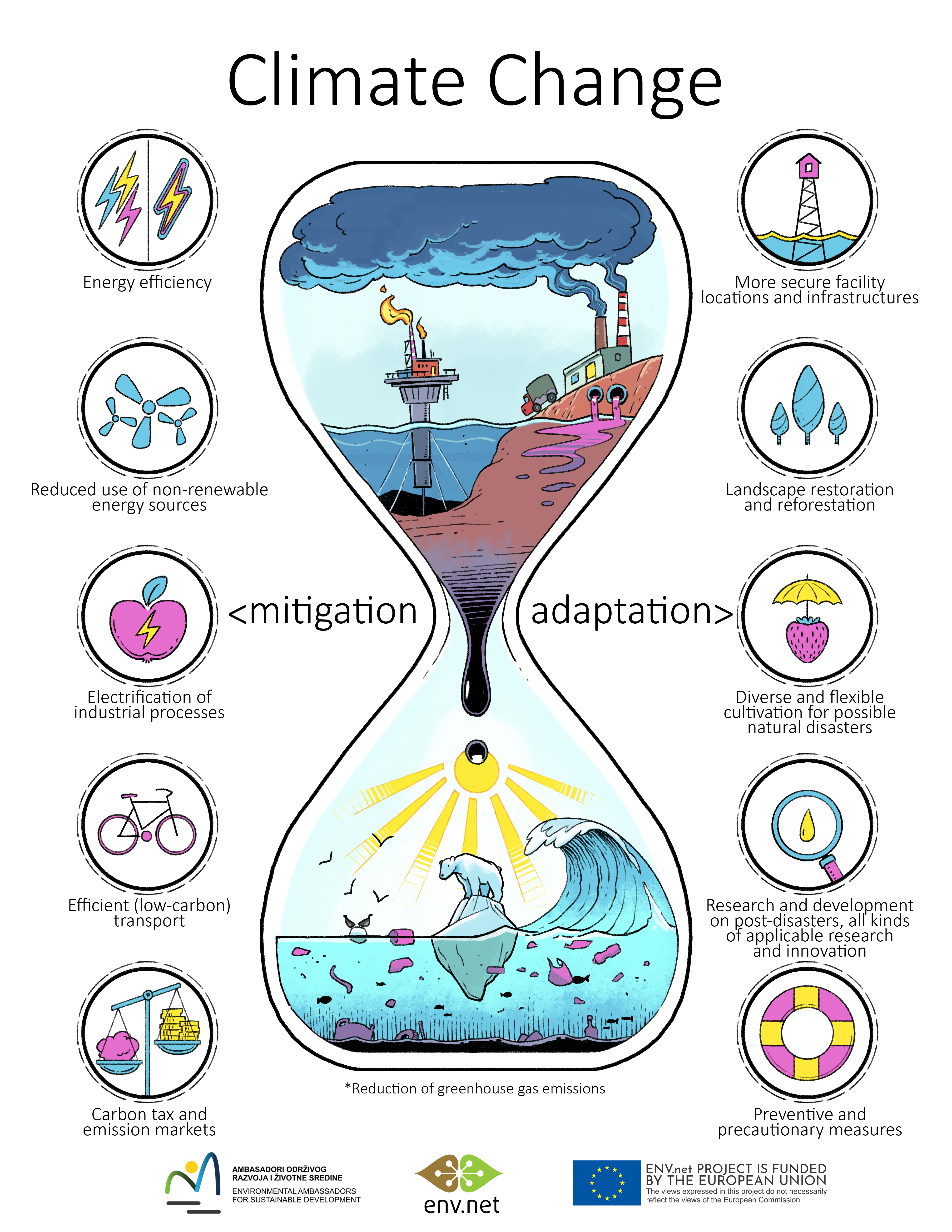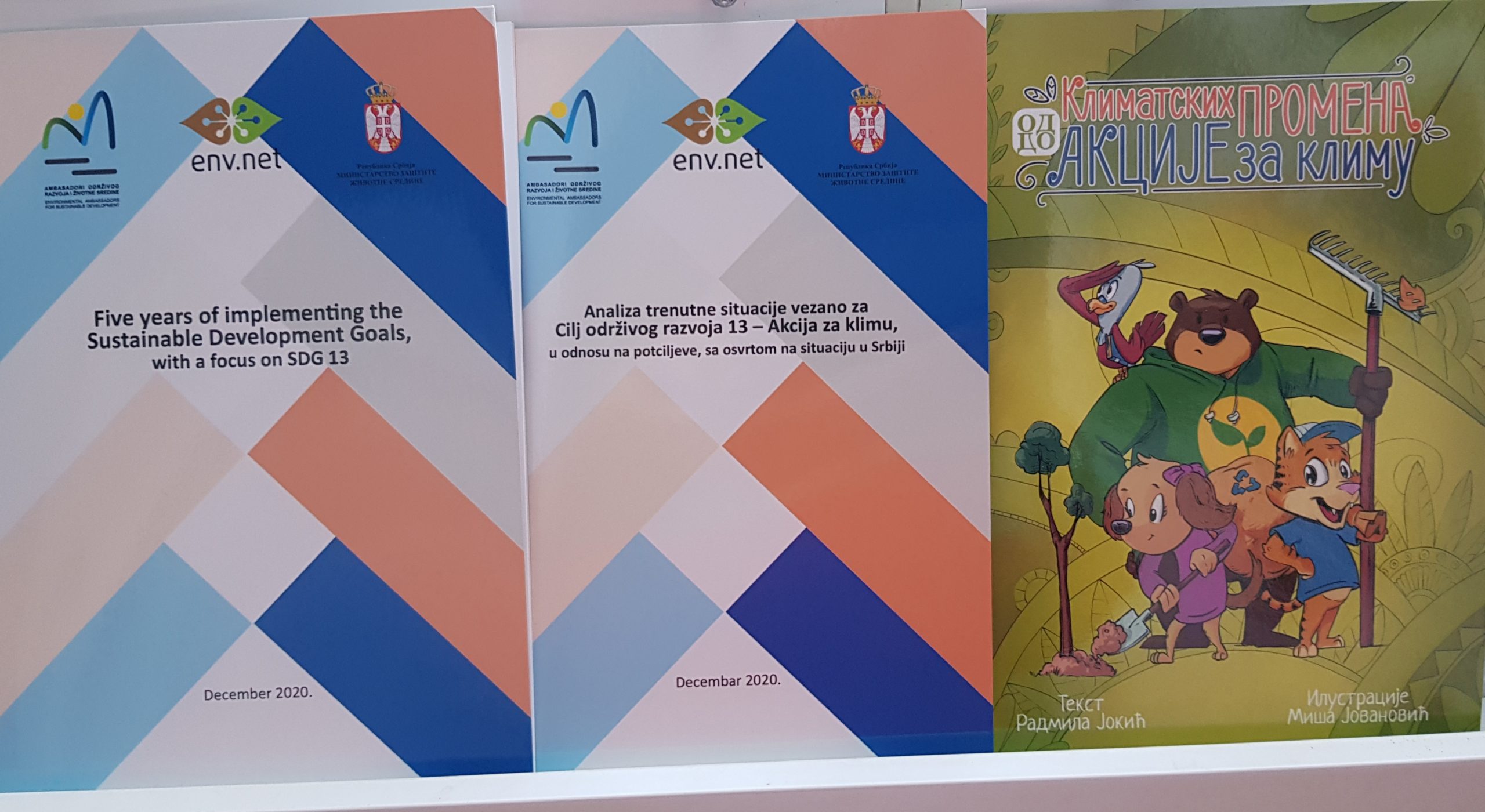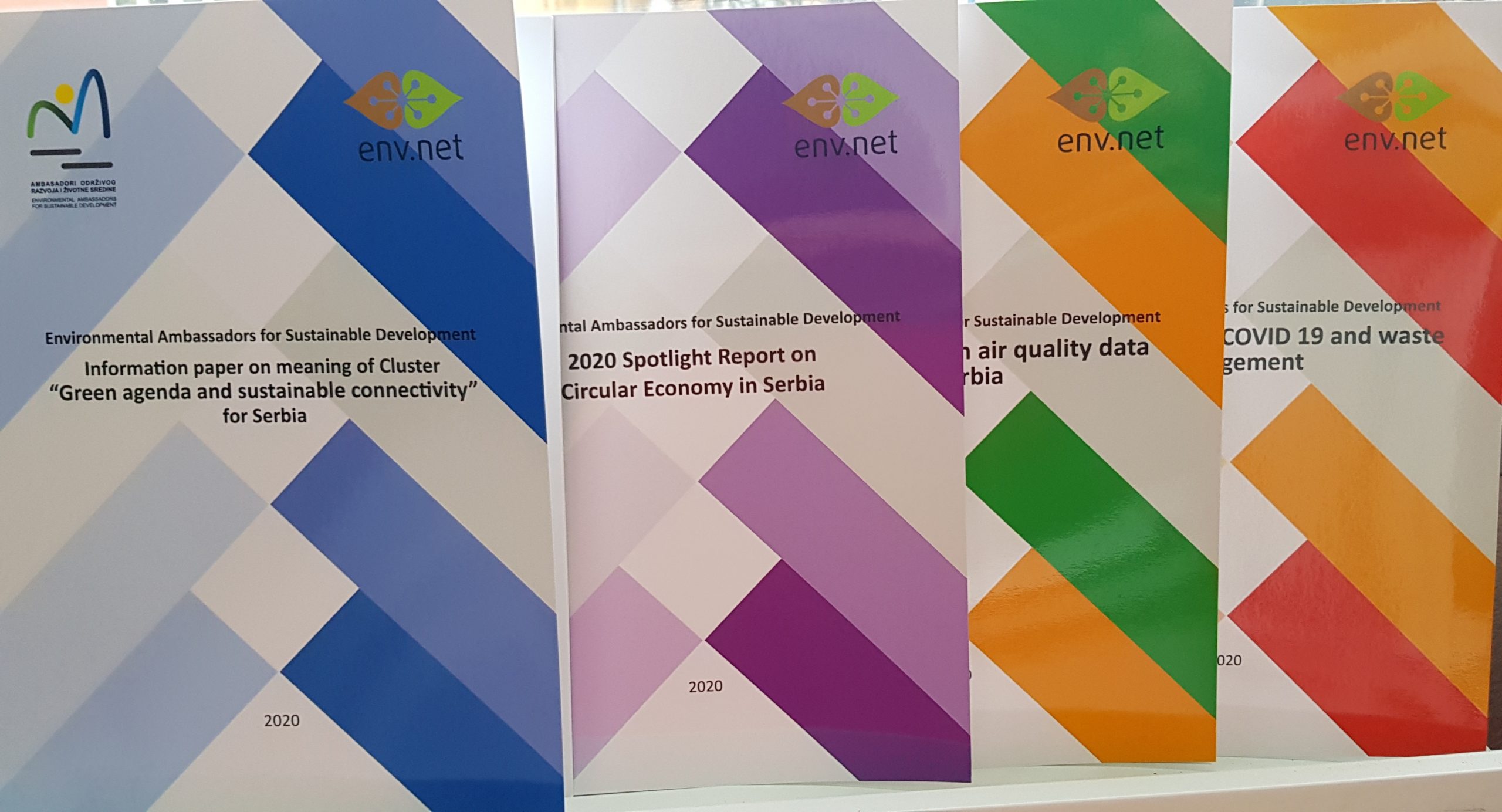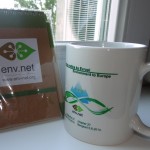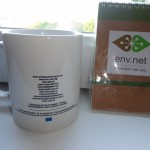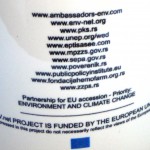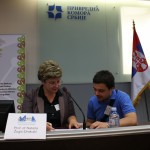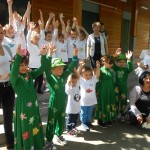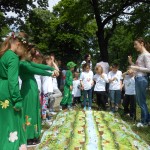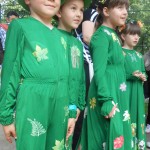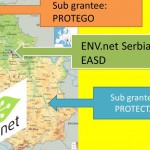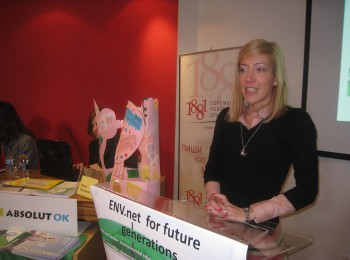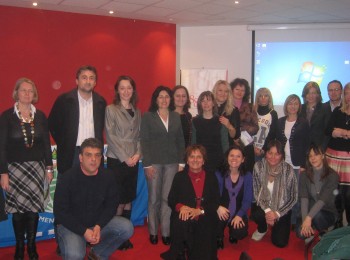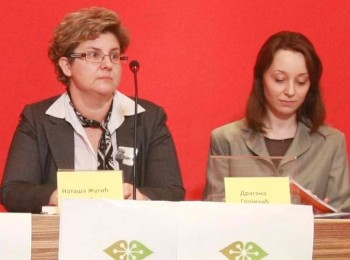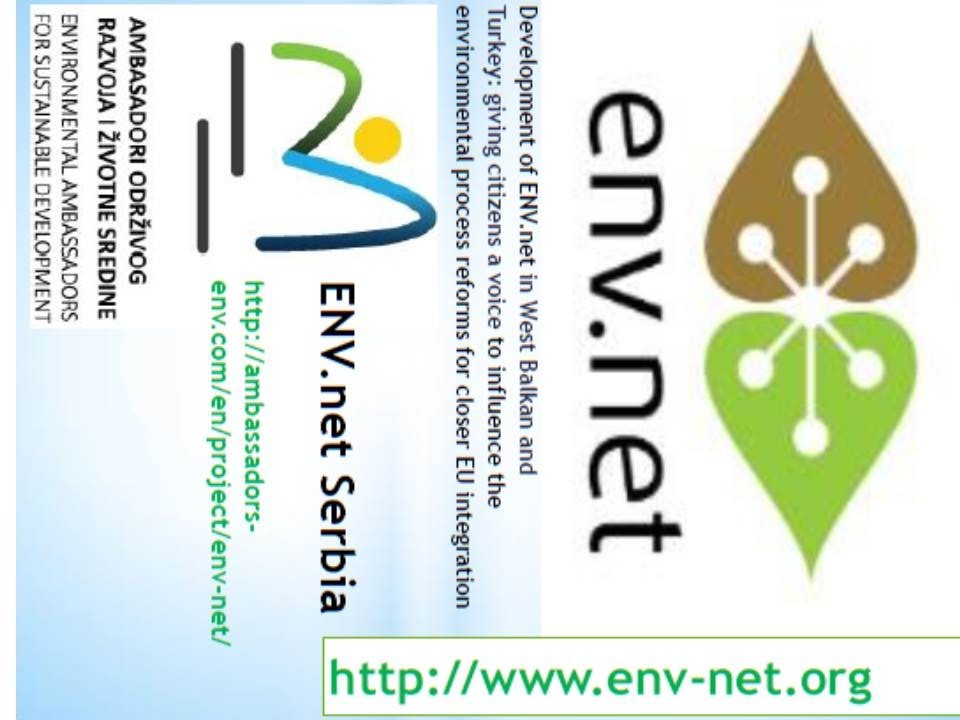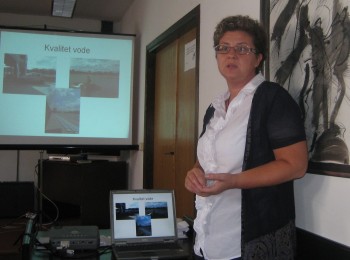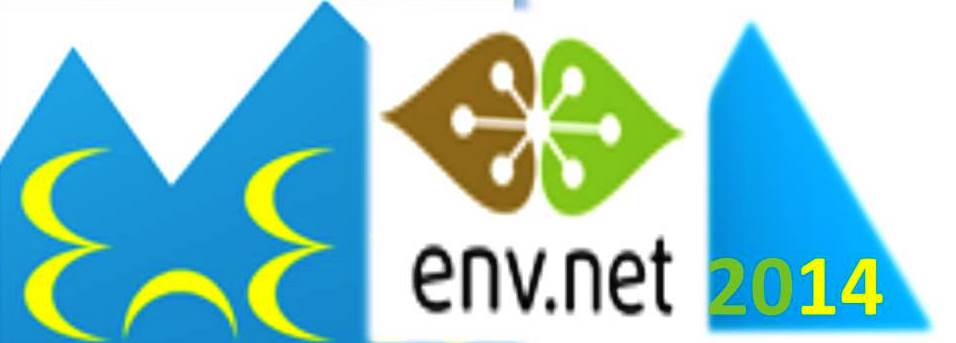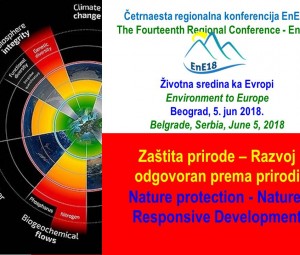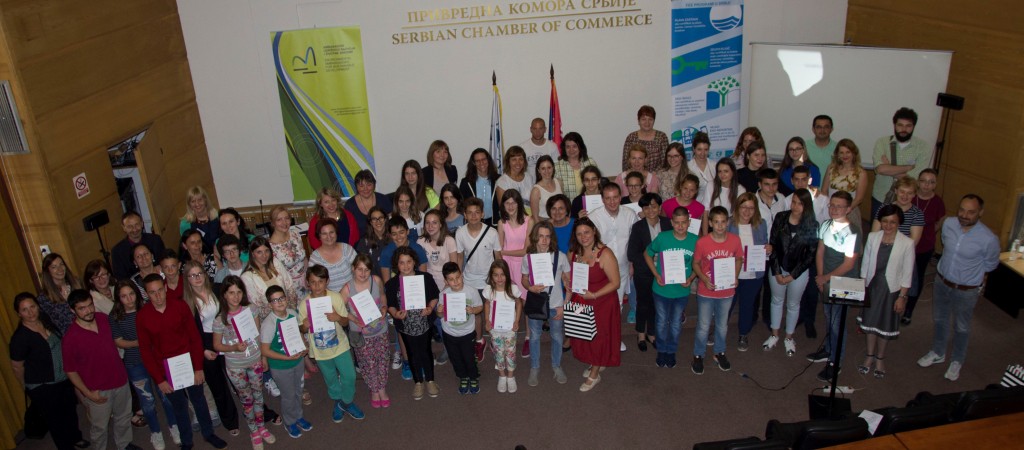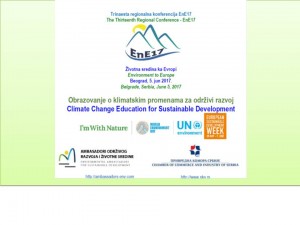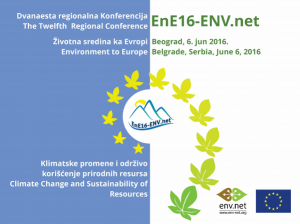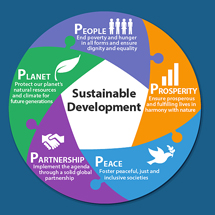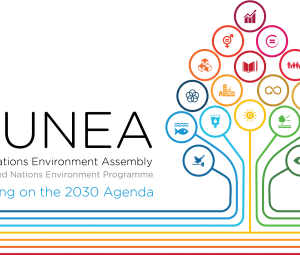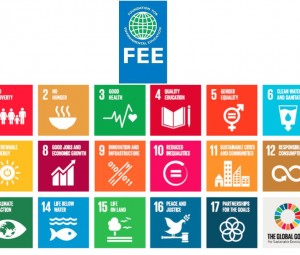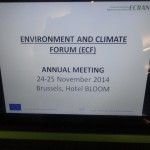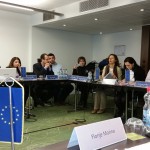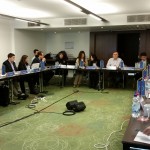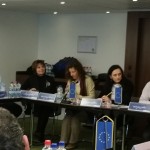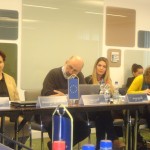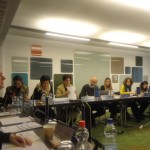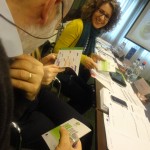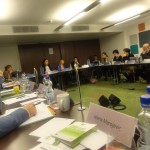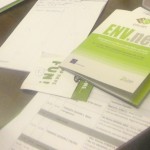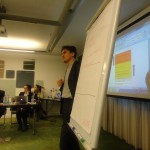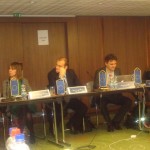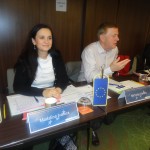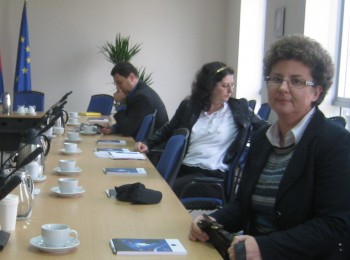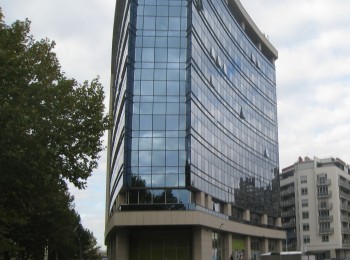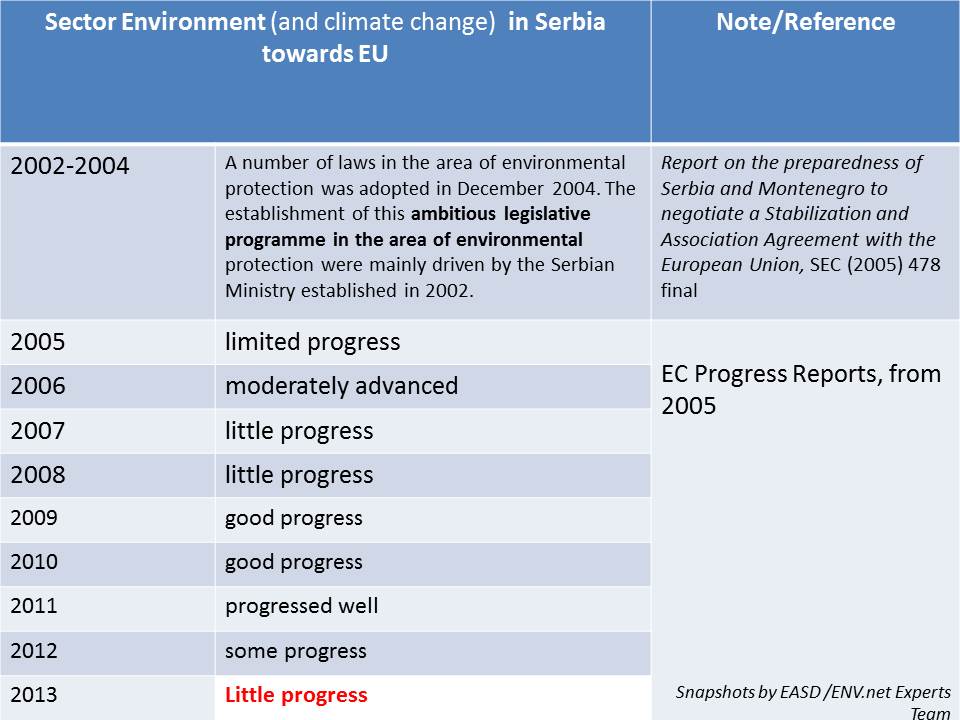The “Green Chair” strengthens the voice of young people and women in environmental protection
The Green Chair Network has received support from the ECO-SYSTEM program for 2024. This program aims to improve environmental protection in Serbia and helps with the implementation of the negotiating platform for Chapter 27. The Environmental Ambassadors of Sustainable Development is a member organization of the “Green Chair” coordination team and a partner in the project.
In 2024, it is planned to carry out activities to achieve…
- Strengthening the voice of young people: Through research and public debate, the “Green Chair” Network will advocate for greater participation of young people in decision-making on environmental protection. The research will focus on the opinions and needs of young people, and the results will be used to advocate for their interests.
- Improving gender equality: The network will focus on empowering women and their more active involvement in all aspects of environmental protection, as well as fertilizing the work of network members. We want women to be leaders in environmental initiatives and the fight against climate change so that their voices are equally important in decision-making processes.
- Sustainability of the Green Bulletin: By digitizing and expanding distribution, the Green Chair will ensure that the voice of the network reaches even more people. The goal is to make information accessible to everyone and to increase awareness and community engagement.
The ECO-SYSTEM Empowerment Programme is the main component of the project ECO-SYSTEM: Support to Environmental Reforms implemented by the Young Researchers of Serbia with the support of the Swedish International Development Cooperation Agency (SIDA). The project started in January 2020 and will run for four years.
ECO-SYSTEM 2024: The “Green Chair” strengthens the voice of young people and women in environmental protection
The Green Chair Network has once again received support from the ECO-SYSTEM program for 2024. This program aims to improve environmental protection in Serbia and helps with the implementation of the negotiating platform for Chapter 27. The Environmental Ambassadors of Sustainable Development is a member organization of the “Green Chair” coordination team and a partner in the project.
The “Green Chair” Network of Organizations brings together 68 civil society organizations dedicated to environmental protection. The network is a key actor in the actions for a sustainable future of Serbia.
In 2023, the members of the network achieved significant results through their work and engagement:
- Education: More than 300 activists have been educated about environmental protection through various workshops and programs.
- Action: Initiatives have been launched to mitigate the effects of climate change in 5 local communities, by raising awareness of the importance of solving this urgent problem.
- Information: The Green Bulletin, the network’s bi-weekly newsletter, has reached a large audience, spreading information on environmental protection throughout Serbia.
In 2024, it is planned to carry out activities to achieve…
- Strengthening the voice of young people: Through research and public debate, the “Green Chair” Network will advocate for greater participation of young people in decision-making on environmental protection. The research will focus on the opinions and needs of young people, and the results will be used to advocate for their interests.
- Improving gender equality: The network will focus on empowering women and their more active involvement in all aspects of environmental protection, as well as fertilizing the work of network members. We want women to be leaders in environmental initiatives and the fight against climate change so that their voices are equally important in decision-making processes.
- Sustainability of the Green Bulletin: By digitizing and expanding distribution, the Green Chair will ensure that the voice of the network reaches even more people. The goal is to make information accessible to everyone and to increase awareness and community engagement.
The ECO-SYSTEM Empowerment Programme is the main component of the project ECO-SYSTEM: Support to Environmental Reforms implemented by the Young Researchers of Serbia with the support of the Swedish International Development Cooperation Agency (SIDA). The project started in January 2020 and will run for four years.
“Citizen science” – definition in 2021 UNECE Document
Environmental Ambassadors for Sustainable Development (Environmental Ambassadors, EASD) is a non-for-profit professional association focusing, among other, work on research and science (professional and participant science/citizen science) promotion. EASD is the member of European Citizen Science Association.
With interest we are following the seventh session of the Meeting of the Parties to the Convention on Access to Information, Public Participation in Decision-making and Access to Justice in Environmental Matters (Aarhus Convention) taking place in Palais des Nations, Geneva from 18 to 21 October 2021. A number of substantive decisions are expected to be adopted at the session that will guide the activities of the Convention in the next intersessional period.
Among documents is document ECE/MP.PP/2021/20/Add.1. There, a number of definitions took our attention; some of them are: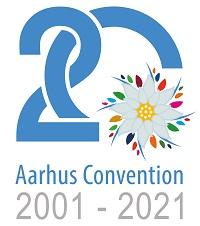
- “Citizen science”, means a form of open collaboration in which members of the public participate voluntarily in the scientific process, engineering research or environmental monitoring in various ways;
- “Citizen science observatories”, refers to community-based environmental monitoring and information systems that invite individuals to share observations, typically via mobile telephone or the web;
- “Research data”, means documents in a digital form, other than scientific publications, which are collected or produced in the course of scientific research activities and are used as evidence in the research process, or are commonly accepted in the research community as necessary to validate research findings and results;
- “Citizen science data”, means data collected by members of the public, often in collaboration with or under the direction of professional scientists, nongovernmental organizations and scientific institutions;
- “Citizen-generated data”, which means data produced through citizen sensing, citizen science and other forms of civic monitoring that share the common denominator that the data collection process is primarily carried out by volunteer individuals actively joining the initiative;
ENV.net
ENV.net project consists of ENV.net 1/2 (2012-2016) and ENV.net 3 (2017-2020) projects. EC supported
ENV.net 1/2: ENV.net – Development of ENV.net in West Balkan and Turkey: giving citizens a voice to influence the environmental process reforms for closer EU integration, EuropeAid/132438/C/
ACT/Multi – 2012/306-642 and 2014/351-610; Partners for project implementation are: Puntosud , EASD , Co-PLAN , EEB – European Environmental Bureau, ATRC and TEMA . The project builds on the experience of an EU-funded project, namely the Environment Forum, implemented in the period 2009-2012, aiming at developing capacities of environmental NGOs to establish a constructive dialogue with national authorities. The present project strategy has been designed to achieve a greater commitment and capacity of a group of CSOs coming from Environment Forum experience and which have agreed on the creation of a new network, the ENV.net, to support the civil activism, give citizens a voice and influence the public reform processes in the approximation to the environment acquis. With the view to further enhance their capacities to work with CSOs and to share experience with other European countries, EEB has accepted to participate and to share its experience. Project objective – Greater commitment and capacity of the ENV.net to give citizens a voice and influence public sector reform processes in the environment sector through analysis, monitoring and advocacy. As one of the outcome National ENV.net networks (to complement Regional ENV.net network) were established; established ENV.net Network in Serbia have 54 organizations (multistakeholders).
ENV.net3: “ENV-net factoring the environmental portfolio for Western Balkans and Turkey in the EU Policy Agenda” – EuropeAid/154870/ACT/Multi ; EASD (Serbia) partners for project implementation are: 4X4X4 Balkan Bridges from North Macedonia, European Environmental Bureau from Belgium, Advocacy Training and Resource Center, from Kosovo*, Green Home, from Montenegro, Lir Evolution, from Bosnia and Herzegovina, TEMA – the Turkish Foundation for Combating Soil Erosion, for Reforestation and Protection of Natural Habitats, from Turkey and Foundation Punto,Sud, from Italy. The project contributes to the improvement of environmental policy-making and implementation in compliance with the EU standards. To this end, the network foresees to contribute to both improved and intensified inter-action among actors (including environmental CSOs, media and policy-makers) and an overall more enabling technical and financial environment where these actors operate. The action sets out to strengthen the profile of ENV.net as the leading network and bridging actor in environmental policy-influencing in the WB and Turkey region (vis-à-vis EU). Further, it foresees introducing and initiating a discussion on the Circular Economy concept in the region, as well as intensifying climate change actions. The action also foresees a number of value-adding, cross-cutting elements such as inter-partner learning/exchange, networking, and thematic organisational support to third parties (i.e. local grass-root organisations, media).
____________________________________
Paper published: Andjelka Mihajlov, Aleksandra Mladenovic & Filip Jovanovic, Contribution to Environmental Communication: comparative analysis of two qualitative methods as the performance to European Union accession, in “Adapt to Survive. The role of social media, sharing and communication to ameliorate this world “, Conference Proceedings Book Edited by Margarita Kefalaki, Communication Institute of Greece (COMinG),Athens, p.57-66 , 2021 ( ISSN: ISBN: 978-618-85622-3-3 ), Available at https://coming.gr/wp-content/uploads/2021/12/1_1_2021_Adapt-to-survive_Book_conf-proceedings_COMinG.pdf
Selected activities:
March 2021:
Information paper on Climate Change and Energy
Information paper on Climate Change and Floods
August 2021: Environmental Communication: Media Archive Reports as a Participant Science Tool
Promotion by media (Da li smo spremni za sve češće poplave?)
December 31, 2020: ENV.net3 project final steps – infographics with documents developed by EASD
____________________________________
Report on monitoring the progress of national environmental legislation (Chapter 27) in 2018, 2019, and half-year 2020, with projections through end-2020 / Izveštaj o monitoringu napredovanja nacionalnog zakonodavstva o životnoj sredini (Poglavlje 27) u 2018., 2019. i prvoj polovini 2020. godine, sa projekcijom do kraja 2020.godine (Extended abstract in English, Full text in Serbian)
Position Paper on COVID 19 and waste management
Circular Economy goes beyond Waste Management presented at EurAsia Waste Management Symposium 2020
Information paper on meaning of Cluster “Green agenda and sustainable connectivity” for Serbia
Reflection paper on air quality data for Serbia
2020 Spotlight Report on Circular Economy in Serbia
EASD publication on circular economy acknowledged by European Circular Economy Stakeholder Platform
Virtual tour on the experience from Italian practices in circular economy
November 2020: Joint civil society statement for Sofia Summit
EASD research presented at EurAsia Waste Management Symposium
October 2020, New Momentum for the Environmental Agenda in the Western Balkans and Turkey?
Establishment of the South East European Platform to Beat Pollution – SEEPP
Recap the moments from EnE19/ENV.net Conference
March 2019: UN Environment : 4th Assembly (and pre- and side-events) , ENV.net related event
November 2018: To report: The first Regional Conference on Circular Economy was success ; The first regional conference on circular economy, Belgrade, November 2018: Agenda
Call for sub-grants (6.novembar 2018: Otvoren poziv za dodelu sub-grantova u okviru ENV.net projekta)
YRE competition: apply before February 1, 2019.; Theme: Energy Efficiency
ENV.net Initiative: to update National Strategy on Sustainable Use of Natural Resources and Goods, by applying Circular Economy concept ; ENV.net Initiative and Knowledge based advocacy: to update National Strategy of Sustainable Use of Natural Resources
Circular economy knowledge based advocacy in Eco-schools network in Serbia
May 2018. Guest lectures made at two Universities in Serbia: “Circular economy is concept and process, and still not full circle” ; Participation at the Green Parliamentary Group meeting
Follow project at : facebook.com/envnetsite/ and www.env-net.org
February 2018 – ENV.net 3 Kick-off Meeting in Tirana
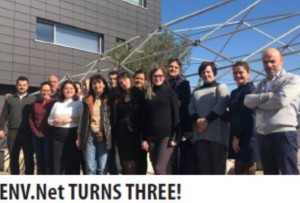 ________________________________________________
________________________________________________
In December 2017. we started with ENV.net 3 : ENV-net factoring the environmental portfolio for Western Balkans and Turkey in the EU Policy Agenda (reference number 2017/394-372)
ENV.net 3 – Serbia team include: Aleksandra Mladenovic –National Coordinator and Manager. In addition, Thematic experts/consultants, on demand, are Prof dr Andjelka Mihajlov and Filip Jovanovic, and Media communication expert, on demend, is Milica Momcilovic.
________________________________________________________________________________
Development of ENV.net in West Balkan and Turkey: giving citizens a voice to influence the environmental process reforms for closer EU integration – EuropeAid/132438/C/ACT/Multi – 2012/306-642 and 2014/351-610 (2012-2016)
The project builds on the experience of an EU-funded project, namely the Environment Forum , implemented in the period 2009-2012, aiming at developing capacities of environmental NGOs to establish a constructive dialogue with national authorities. The present project strategy has been designed to achieve a greater commitment and capacity of a group of CSOs coming from Environment Forum experience and which have agreed on the creation of a new network, the ENV.net, to support the civil activism, give citizens a voice and influence the public reform processes in the approximation to the environment acquis. With the view to further enhance their capacities to work with CSOs and to share experience with other European countries, EEB has accepted to participate and to share its experience. Project objective – Greater commitment and capacity of the ENV.net to give citizens a voice and influence public sector reform processes in the environment sector through analysis, monitoring and advocacy.
Partners for project implementation are: Puntosud , EASD , Co-PLAN , EEB – European Environmental Bureau , ATRC and TEMA . EASD Activity circles represent the scope of our activities.
Project launched site for presentation of activities in all participating countries, as well as facebook page and ENV.net Newsletters.
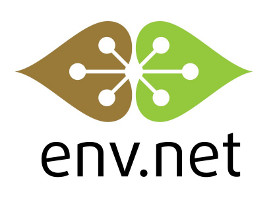 ENV.net 1/2– Serbia team include: Dr Nataša Žugić Drakulić –National Coordinator and Filip Jovanović – project manager , chosen in transparent process by „ Environmental Ambassadors for Sustainable Development“, partner organisation in this project. In addition, National consultant for European integration is Prof dr Andjelka Mihajlov , dr Hristina Stevanović Čarapina is leading expert .
ENV.net 1/2– Serbia team include: Dr Nataša Žugić Drakulić –National Coordinator and Filip Jovanović – project manager , chosen in transparent process by „ Environmental Ambassadors for Sustainable Development“, partner organisation in this project. In addition, National consultant for European integration is Prof dr Andjelka Mihajlov , dr Hristina Stevanović Čarapina is leading expert .
__________________________________
ENV.net Serbia network is functioning : Some of activities could be followed only in Serbian, like calls to participate, and other actions targeted to citizens in Serbia.
**************************************
Highlights: ENV.net publications
- A Guideline of EU Accession Monitoring Tools for CSOs in candidate and potential candidate countries: Chapter 27, (Authors and contributors: Andjelka Mihajlov, Natasa Zugic-Drakulic, Filip Jovanovic, Federico Bastia, Simona Pogliani, Mara Silina, Teida Shehi and Dusko Hristov), Published by Environmental Ambassadors for Sustainable Development with the financial assistance of the EU – ENV.net project document, Belgrade January 2015
- How to influence environmental policy through effective advocacy (Authors: Margherita Tolotto and Mara Silina), ENV.net Advocacy Toolkit, European Environmental Bureau, Brussels, January 2015
- Climate change and challenges of the enlargement (Authors: Anja Kolmuss, Dragana Mileusnic, Zanna Vanrenterghem and Richard Filcak), ENV.net Advocacy Toolkit, European Environmental Bureau, Brussels,September 2016
June 2016: Agenda, WED Messages from Serbia: 12th Regional Conference “Environment to Europe” , REPORT FROM EnE16-ENV.net, BELGRADE, SERBIA
April 2016 – ENV.net Course: CSO Participation in Accession Process , Chapter 27: CSOs participation
March 2016 – New internet portal: Greenweb
January 2016 – Save the date for EnE16-ENV.net Conference ; We participate: Regional Conference: „Sustainability of the FPAs” , Brussels . Water-food-energy-ecosystems nexus assessment in the Sava River Basin – Lessons learned and further steps
October – December 2015 – Ministry support to ENV.net , Event
October – Partnership for Climate Change issue : Serbia’s climate talks – on the way to Paris
June 11 – European Commission Vice-President Mr Maroš Šefčovič had meeting with CSOs in Belgrade. EASD participate!
June 7 – Bicycling-ENV.net promotion in town Gornji Milanovac , Green day in Gornji Milanovac
June 5 – Regional Conference ”Environment to Europe” EnE15 – ENV.net EU Environmental Horizontal Legislation: Methods, Standards and Tools , Invitation , AGENDA , Proc. of papers
May 26, 2015 – Promotional activity
April 21, 2015 – Participation in Public Hearing on Climate Change related challenges in Republic of Serbia
April – THE ELEVENTH REGIONAL CONFERENCE ENVIRONMENT TO EUROPE – ENE15 – ENV.NET acknowledged as the European Sustainable Development Week event
March 22 – Celebrating the World Water Day in Serbia: field visit to Ada Ciganlija
February 2, 2015: Invitation for EnE15-ENV.net Conference launched
January 29, 2015: A Guideline of EU Accession Monitoring Tools for CSOs in candidate and potential candidate countries (ENV.net region): Chapter 27 , document finalized
January , 2015: Promotion of Publication
December 31: Thematic Publication “Environment to Europe”, 2014 ( Tematski zbornik radova “Životna sredina ka Evropi”)
December 12: ENV.net Serbia Seminar: Environmental Education in Schools
November 24-25, ENV.net on the margins of ECF Annual Meeting in Brussels with European Commision
November 4-5 , Regional training on the process of designation of potential Natura 2000 sites
October 30 – Conference “EU accession in the field of environmental protection and the role of local authorities”
October 28 – Ministry of Agriculture and Environmental Protection is co-funded ENV.net project , contract signed
October 22-23, Belgrade: ENV.net training: “EU project design process and Implementation of environmental policy”, Invitation , Agenda , Training
October 2014 – ENV.net brochure published and presented
October 14 – ENV.net related: Participation on Conference “Eco-standards and Education”
October 8 – “Little progress has been made in the areas of environment and climate change”
September 29 – ENV.net Round-table Dialogue for Green Future (ENV.net okrugli sto sa niškim srednjoškolcima “Dijalogom ka zelenijoj budućnosti“) (sub-grant)
September 23-25, Brussels: ENV.net preparatory partnership meeting and Framework Partnership Agreement (FPA) Closing Event for Phase I
September 19-24 , We are following Explanatory Screening for the Chapter 27
August 29 – ENV.net (sub-granting) publication published PUBLICATION : “Species of plants and animals of special conservation concern in EU” , in Serbian
July 27 – Partnership with media – Radio Beograd 2
June 19 – Eco-package initiative as the example environmental education for the future EU citizens
June 5 – CONFERENCE , ENV.net multi-stakeholder Conference on Chapter 27: about 200 participants
June 4 – Meeting with media , Moments from the Conference for Media
May 29, 2014 – ENV.net Serbia Conference organisation on the good track –Agenda for EnE14/ENV.net Conference “Environment to Europe”, June 5, 2014 in SCC – opening at 10:00
May 22-24, 2014 – 4th Partners Meeting in Milan
May 13, 2014 – European Solar Days – participation in promotion of EU environmental values
May 10, 2014 – ENV.net Let us clean up Europe! event: Ada Ciganlija Beograd ; ENV.net Serbia with children, parents and teachers “cleaning up Serbia” , Event in pictures
May 22-24, 2014 – 4th ENV.net Partners Meeting in Milan
May 7-8, 2014 – Some of ENV.net Partners meet in the corridors of ECRAN ECF Meeting
April 25, 2014 – UNEP acknowledged EnE14-ENV.net 2014 Conference as the World Environmental Day Event
April 5, 2014 – Education for future citizens of EU: guest lecturing at the Law Faculty
April 4, 2014 – EU Delegation to Serbia: Consultative Meeting with CSOs on progress towards EU in 2014
Aprl 4, 2014 – We participated to the meeting related to EU-Serbia Civil Society Joint Consultative Committee – JCC
April 2, 2014 – ECRAN NGOs Environment and Climate Change Forum – Evaluation Outcome – Congratulation to ENV.net partners!!!!
April 1, 2014 – Protego and Protecta sign subcontracting contracts
Marc 20-9, 2014 – EASD written contribution to the 2014 Progress Report
March 25, 2014 – Participation on UNECE consultation related to the 3rd EPR for Serbia
March 23, 2014 – ENV.net sub-grants winners announced , ENV.net
March 20, 2014 – We participate on Panel at Faculty of Organisation Sciences – University of Belgrade : Knowledge about Environment
March 9, 2014 – Technical (formal requests) evaluation of sub-grants application finished: 45 projects eligible for further evaluation
March 6, 2014 – Promotion of global activity EARTH HOUR (Marh 29, 20:30-21:30) and call for participation
March 4-6, 2014 – We participate in Zagreb on Workshop on Water-Food-Energy-Ecosystems Nexus Assessment in the Sava River Basin
From February 2014 – EU negotiation process: we are following explanatory screenings
February 26, 2014 – In accordance with procedure, QUESTIONS by potential applicants with our ANSWERS are posted on web site on February 26, at 07:00 , taking in account questions received by February 25 at 23:59
February 20-21, 2014 – EASD-ENV.net Serbia participated in defining the first strategic framework for CSOs development
February 18,2014- Knowledge based advocacy: Environment should be within priorities in the negotiations with EU
February 13, 2014 – Environment in youth policy in Serbia
February 12, 2014 – Meeting with ENVAP2 Project representatives
February 7, 2014 – Participation on Training related the Sector Planning Documents – SPDs
February 1, 2014 – Call of proposals for ENV.net sub-granting in Serbia “EU: we watch and learn to be ready!”
January 30, 2014 – Participation on public hearing by the European Economic and Social Committee (EESC) Study Group
January 30,2014 – Thematic meeting of the SECO mechanism on IPA II programming
January 30, 2014 – Participate in the Mapping of CSOs and other stakeholders in in the process of EU accession negotiations
January 19, 2014 – EASD / ENV.net Team reading of European Parliament Resolution, January 2014
January 07, 2014 – Starting preparation for ENV.net 2014 Round-table / Conference
January 2, 2014 – Attention to ENVIRONMENT in EUROPA DAIRY
_______________________________________________________________
December 23, 2013 – Workshop on environmental values for kindergarten children from Sombor (Minutes) , Participation on meetings in Nature Protection Institute and Agency for Environmental Protection
Decembar 20, 2013 – In media : Promotion of knowledge based information
December 20, 2013 – Environmental Education for future EU citizens , Minutes
December 17, 2013 – ENV.net region news: European Affairs ministers give green light to Serbia’s EU negotiations
December 16, 2013: Workshop for strategic planning of further work SECO mechanism
December 3, 2013 – ENV.net presented to the master students of Faculty of Security Studies
December 2, 2013 – Eye on EU integration process: Parliament of Serbia , Eye on SEE regional cooperation
November 28, 2013 – Meeting FPA project grantees with DG Enlargement representative
November 25, 2013 – Partnership with Media : Partnership agreement with Journalist’ Association of Serbia
Environmental Education of future EU citizens: Activity on November 19,2013
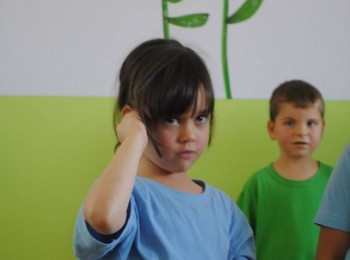 |
Acknowledging the outreach of ENV.net Survey and ENV.net 2013 Roudtable recomendations, EASD – ENV.net Serbia recognized importance of children/youth education for active EU citizenship , through promotion of EU environmental values. We would like to share moments from kindergarten “Pčelice”, from village Šetonje, as promotion event for environmental values in education. With children and teachers, as well as EASD Team, there were Prof dr Ivica Radovic and mr Ljubiša Antonijević, assistant ministers for education and science. |
Partnership with municipality – On November 18., 2013, ENV.net project presented on the Round table in Municipality Vračar (within City of Belgrade).
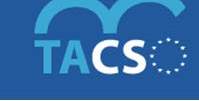 Cooperation with TACSO Serbia – On November 15. 2013, in Belgrade, TACSO Advisory Committee (LAG) organized a consultative meeting with representatives of civil society organizations and networks and Serbian civil society expert community. At the meeting a draft of a document on the assessment needs of civil society in Serbia was discussed.
Cooperation with TACSO Serbia – On November 15. 2013, in Belgrade, TACSO Advisory Committee (LAG) organized a consultative meeting with representatives of civil society organizations and networks and Serbian civil society expert community. At the meeting a draft of a document on the assessment needs of civil society in Serbia was discussed.
 EASD prepared Opinion and contribution to the Draft Strategy Paper for the Republic of Serbia 2014-2020. Through SECO mechanism opinion is sent to Governmental Office for European Integration. Opinion is based on Serbia 2013 Progress Report and Strategy – Reading by ENV.net Serbia Team .
EASD prepared Opinion and contribution to the Draft Strategy Paper for the Republic of Serbia 2014-2020. Through SECO mechanism opinion is sent to Governmental Office for European Integration. Opinion is based on Serbia 2013 Progress Report and Strategy – Reading by ENV.net Serbia Team .
Organisation capacity building process: EASD acknowledged becoming IPEN network Participating Organization
Eye on environmental laws changes: monitoring compliance with EU directives
November 2013. – The third ENV.net partnership meeting in Milan
28. October – Meeting with European Parliamentarians
ENV.net Serbia Team prepared document: Reading of 2013 Progress Report for Serbia and Strategy by ENV.net Serbia Team ( Serbia 2013 Progress Report and Strategy – Reading by ENV.net Serbia Team ).
____________________________________________________
22. and 23 October – Education on sustainable management of lead/chemicals
October 18 – EC Delegation in Serbia, present to relevant CSOs, on October 18, 2013 , Serbia Progress Report 2013, in which the Commission services present their assessment of what Serbia as the candidate country has achieved over the last year.
October 2013 : Participated on different events organized to raise awareness to EU approximation environmental challenges.
Promotion of ENV.net facebook page!
October 2, 2013 – ENV.net team participated at the First SEE Regional Science Promotion Conference (SCIPROM), opened in Belgrade, with the aim to bring together science promotion professionals, practitioners and enthusiasts to share experience and network in order to strengthen the link between science and society in our Region. In the current competitive global environment it is an imperative to enhance economic and social capacities by improving the educational structure of society, inspiring innovation and technological advancement and creating a milieu for appreciation of the value and benefits of knowledge. In the opening address, Minister for Education, Science and Technology development of Serbia underlined, among others the importance of knowledge based actions, as well as the importance of drinking water for development. Conference bring international experts and representatives of international organizations, research and educational institutions, science camps, science communicators, NGOs, private sector and media on board.
This conference justify the path of ENV.net Serbia implementation and development, linking European Integration, Knowledge based activities and sectors : Education, Science and Environment/Natural Resources.
____________________________
Waste management and water management are considered as two important segments of environmental acquis and studies in this area represent an important aspect of ENV.net project. Environmental accession status of Serbia ( waste , water and EIA thematic issues) was presented by EASD team at International Conferences in Vienna (Austria) and Zadar (Croatia), as well as on chemicals at SAICM Regional Meeting (Skopje, Macedonia FYR).
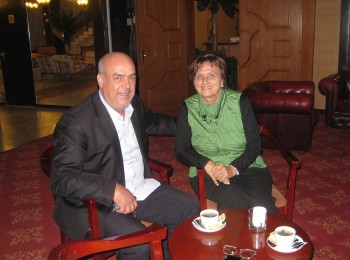 In addition, possible ENV.net partnerships are discussed with other participants and interested CSOs.
In addition, possible ENV.net partnerships are discussed with other participants and interested CSOs.
In Skopje, EASD representative met Macedonian 4x4x4 BB representative on September 26, 2013, to discuss possible enlargement of ENV.net project to Macedonia.
________________________________________
Promotion of ENV.net site in place Join us!
Added value for ENV.net Serbia is EASD activities within the development of Post-Rio+20 Agenda.
Office for Cooperation with Civil Society organized on September 6, 2013 Conference devoted to negotiating Chapter 27 (Environment). Presentation (in Serbian) from the Conference includes: Poglavlje 27 pregovori, Iskustvo R Slovenije, Natura 2000 Ministarstvo, Uloga civilnog drustva u monitoringu, Natura 2000 NGO )
September 2013: ENV.net project presented in the Ministry of Education, Science and Development of Serbia (Meeting of the National Committee for Environmental Education Programs)
August 2013. – Snapshot analysis : While waiting for EC 2013 Progress Report
___________________________________________________________________
ENVIRONMENT TO EUROPE – EnE
This project/process present different phases towards European values, as well as globally values promoted through Multilateral Environmental Agreements. Started to raise awareness of the importance of the UNECE Ministerial “Environment for Europe” Belgrade 2007 Conference, and further continuously is mobilizing interesting parties in Serbia and Region to catalyze environmental and sustainable development.
Within “Environment to Europe” Process, EASD actively participate and organize different supporting activities in different related thematic areas, like sustainable consumption and production, efficient resource use, chemicals, eco-consumers protection, participation at global, EC, regional and with papers at different conferences, etc. Regional cohesion projects supported Environment to Europe process.
__________________________________________________
EEB 2022 ANNUAL CONFERENCE – “Boosting the Deal for a Greener Europe in Turbulent Times”
Study visit to Grenoble – the Green Capital of Europe
EnE22, June 2022 – UNEP@50 and World Environment Day
December 2021 – Climate Pact for Serbia: Snapshot targeted rehearsal of country’s obligations in climate action….
Virtual tour on the experience from Italian practices in circular economy
Recap the moments from EnE19/ENV.net Conference
WEBINAR – Regional Forum of Sustainable Development (RFSD) for the UNECE Region : we participate
EASD full member in European Environmental Bureau – honor and challenge
The ESDN Conference 2018 – we participate ; We participate – ESDN Conference 2018, “Stakeholder-Policy Cooperation in the Age of the SDGs: What new approaches are required to be successful?”, Vienna (Austria), 1-2 October, 2018
Join us for June 5th: Conference Agenda is available
6th UN regional meeting on SAICM, Poland, February 2018: we participate
February 2018: Call for participation for EnE18: Nature protection – Nature-Responsive Development
February 2018: ENV.net 3 Kick-off Meeting in Tirana
November 2017: EASD participate: Summit to Plan the End of Amalgam in Europe 2017– November 20-21, Berlin
September 2017: “Make Mercury History” – EASD participated at Minamata COP1 in Geneva
July 2017: Civil Society Forum in Trieste, 11-12 July 2017 – we (EASD) participate ; Good signal: Serbia gets (again) separate Ministry of environmental protection
June 2017: Climate Change Education for Sustainable Development
April 2017: Call: The Thirteenth Regional Conference ”Environment to Europe – EnE17″, June 5th 2017, Belgrade
February 2017: “EnE17 – The 13th Regional Conference Environment to Europe” announcement: Climate Change Education
June 2016: Agenda , EnE16-ENV.net Zbornik radova/Proceedings of papers ; WED Messages from Serbia: 12th Regional Conference “Environment to Europe” , REPORT FROM EnE16-ENV.net, BELGRADE, SERBIA
January 2016 – Save the date and participate: June 6, 2016 – Environment to Europe Conference
June 5, 2015 – 2015 Conference, Information, Proc. of papers
We participate at European Green Week
December 2014 – Thematic Publication “Environment to Europe” ( Tematski zbornik radova “Životna sredina ka Evropi”)
June 5, 2014 – ENV.net multi-stakeholder Conference on Chapter 27: about 200 participants , 2014 Conference
Agenda for EnE14/ENV.net Conference “Environment to Europe”, June 5, 2014 in SCC – opening at 10:00
Invitation for EnE14-ENV.net Conference, June 5 – 2014 in Belgrade
EnE14 / ENV.net Conference will be held on June 5, 2014 in Belgrade (it will 10th regional conference!). Thematic focus: Chapter 27. Reserve the date! More information soon. Follow the updated information related to event.
__________________________________________________
EnE13 – Environment to Europe Conference on June 10, 2013 is focused on local environment. The main messages from this participatory ENV.net event are: environmental sector activities should be knowledge based, and education for environment and sustainable development should be priority. Capacities and continuity is very important for inclusion environment in other sectoral policies. Conference is institutionally supported by Ministry of Energy, Development and Environmental Protection and Ministry of Natural Resources, Mining and Spatial Planning, as well as National Commission for UNESCO. This Conference is UNEP WED event.
| 2013 | EnE13 | ENV.net Roundtable Focus: Local Environment | Agenda, Zbornik radova EnE13 – Zivotna sredina ka Evropi – Papers Proceedings; Minutes; More than 120 participants at EnE13 conference/ENV.net Roundtable: 10 June, 2013 in Belgrade |
Snapshots from the previous EnE “Environment to Europe” Conferences:
| Thematic focus | Published materials | ||
| 2005 | EnE05 | Thematic focus : The importance of Environmental Sector in EU Integration process | Detailed Agenda published.CD Proceedings of Papers published. Book “Sustainable Development and Environment towards Europe in 95+ steps”, by A.Mihajlov, published in Serbian |
| 2006 | EnE06 | European/developed countries values in environmental and related issues; lessons learned. At the same time, the Civil Society Forum EfE07 Meeting towards UN Pan-European Ministerial Conference Belgrade 2007 “Environment for Europe” held. | Detailed Agenda published.CD Proceedings of Papers published. Book “Sustainable Sustainable Development and Environment Towards Europe in 95+ Steps”, by A.Mihajlov, published in English |
| 2007 | EnE07 | Dedicated to contribute to upcoming UNECE “Environment for Europe” (2007, Belgrade) Pan-European Ministerial Conference ; NGO Declaration on Environmental Cohesion of Western Balkan agreed | Detailed Agenda published.CD Proceedings of Papers published. |
| 2008 | EnE08 | Youth and Vulnerable Groups in Environmental EU Accession | Detailed Agenda published. EnE08 Zbornik radova 4. regionalne Konferencije „Zivotna sredina ka Evropi“-sadrzaj published. |
| 2009 | EnE09 | Climate Change and Sustainable Tourism Conference | Detailed Agenda published (agenda EnE09) ; CD Proceedings of Papers published. |
| 2010 | EnE10 | Green Education and Green Economy | Detailed Agenda published ( Agenda EnE10 Konferencije ); CD Proceedings of Papers published. |
| 2011 | EnE11 | Rural and Mountain Sustainable Development | Detailed Agenda published (agenda_ene11) CD Proceedings of Papers published. Publication with selected paper published. |
| 2012 | EnE12 | Learning event for Rio=20 preparation – Green Economy and Governance for Sustainable Development | Detailed Agenda published ( Agenda EnE12 )
CD Proceedings of Papers published. UNDP/UNEP Green Economy Study published http://sustainabledevelopment.un.org/content/documents/984serbia.pdf |
Join us for June 5th: Conference Agenda is available
Pictures from the event:
Otvaranje / Opening
Panel o zastiti prirode / Panel on Nature Protection
UNEP nagrade / UNEP@WED
YRE awwards/ Nagrade Mladih ekoreportera & https://www.facebook.com/mladiekoreporteri/
Prezentacija radova / Presentations
The Fourteenth Regional Conference – EnE18
Environment to Europe
Belgrade, Serbia, June 5, 2018
Nature protection – Nature-Responsive Development
Conference Agenda, draft, as on 22/05/2018
Conference “Environment to Europe” – EnE18 is an official event that marks the UN World Environment Day (WED) in the Republic of Serbia and region. Since its beginning in 1974, World Environment Day has developed into a global platform for raising awareness and taking action on urgent issues from marine pollution and global warming to sustainable consumption and wildlife crime. “Beat Plastic Pollution”, the theme for World Environment Day 2018, is a call to action for all of us to come together to combat one of the great environmental challenges of our time. Chosen by this year’s host, India, the theme of World Environment Day 2018 (If you can’t reuse it, refuse it) invites us all to consider how we can make changes in our everyday lives to reduce the heavy burden of plastic pollution on our natural places, our wildlife – and our own health. In recent years, millions of people have taken part in thousands of registered activities worldwide.
Conference “Environment to Europe” – EnE18 is an official event that marks the European Sustainable Development Week (ESDW) in the Republic of Serbia. The ESDW is a European-wide initiative to stimulate and make visible activities, projects and events that promote sustainable development and the Sustainable Development Goals (SDGs). It takes place every year from 30 May until 5 June. The ESDW aims to raise awareness for the 2030 Agenda in Europe and calls upon local stakeholders to actively engage with sustainable development, in general, and the SDGs, in particular.
The Fourteenth Regional Conference EnE18 is thematically focused on Nature protection – Nature-Responsive Development (2018). Since 2005, when we established the Conference, we have around 2.500 participants from 15 countries and presented about 350 research and scientific papers. This year is also fourteen years of partnership between “Environmental Ambassadors for Sustainable Development“ with the Chamber of Commerce and Industry of Serbia“.
Conference Agenda
as on 22/05/2018; possible changes of Agenda when confirmation received
5. jun June 5th
| Velika sala u PKS, II sprat, Terazije 23, Beograd | Main Hall, 2nd floor – Serbian Chamber of Commerce, Terazije 23, Belgrade |
9:00 – 10:00 Registracija učesnika / Registration
10:00 – 10:50 Uvodna obraćanja / Opening remarks
Moderator: dr Uroš Rakić, on behalf of organisators
- H.E. Ratko Vlajkov, Ambassador, Embassy of the Republic of Bulgaria in the Republic of Serbia – The Bulgarian presidency of the Council of the EU / Ambasador, Ambasada Republike Bugarske u Republici Srbiji
- H.E. Lazar Mirkić, Ambassador, Embassy of Bosnia and Herzegovina in the Republic of Serbia / Ambasador, Ambasada Bosne i Hercegovine u Republici Srbiji
- Robert Nygård, The First Secretary Responsible for Environmental Issues, Swedish Embassy in the Republic of Serbia / Prvi sekretar odgovoran za pitanja životne sredine, Ambasada Švedske u Republici Srbiji
- Delegation of EU in Serbia, representative / Delegacija EU u Srbiji, predstavnik/ (potvrđeno/confirmed, representative tbd)
- Minister for Environment / Ministar za zaštitu životne sredine (invited/pozvan)
- Stanojla Mandić, Deputy Commissioner for Information of Public Importance and Personal Data Protection of the Republic of Serbia / Zamenica poverenika za informacije od javnog značaja i zaštitu podataka o ličnosti Republike Srbije
- Dr Deni Porej, Director of WWF Adria, WWF Mediterranean Programme Office / Direktor WWF Adria, WWF Regionalna kancelarija
- Aleksandra Šiljić Tomić, Project Coordination Specialist, UN Environment Republic of Serbia / Koordinator projekta, Kancelarija UN za životnu sredinu, Republika Srbija
- dr Nenad Sekulić, Head of Department for Biodiversity and Ecological Network, Institute for Nature Conservation of Serbia / Načelnik odeljenja za biodiverzitet i ekološke mreže, Zavod za zaštitu prirode Srbije
- Goran Krnčević, Assistant Director of the Sector for Legal, Financial and Administrative Affairs, Institute for Nature Conservation of Vojvodina Province / Pomoćnik direktora za pravne, finansijske i opšte poslove, Pokrajinski zavod za zaštitu prirode
- Ljubica Naumović, Environment Executive, Tetra Pak Production / referent za zaštitu životne sredine, Tetra Pak Production
- Dušan Stokić, Co-organizer of the EnE18 Conference, Head of the Department for Environment, Technical Regulation, Quality and Social Responsibility, the Chamber of Commerce and Industry of Serbia / suorganizator EnE18 Konferencije, Rukovodilac Službe za životnu sredinu, tehničke propise, kvalitet i društvenu odgovornost, Privredna komora Srbije
- prof. dr Dunja Prokić, the EnE18 Conference Chair person, Environmental Ambassadors for Sustainable Development / predsedavajuća EnE18 Konferencije, Ambasadorka održivog razvoja i životne sredine
10:50 – 11:00 Aleksandra Mladenović, Environmental Ambassadors for Sustainable Development President/ Predsednica Ambasadora održivog razvoja i životne sredine, Plenary, Panel Theme and Panelists / Predstavljanje plenarnog izlaganja, panela i panelista
11:00 – 11:20 Plenary lecture / Plenarno predavanje
Begona Matilla Soloaga, Human Dynamics, Team leader, TA for strengthening the National Nature Protection System for implementation of Natura 2000 requirements / Human Dynamics, tim lider, NATURA 2000 Turska. Focus : NATURA 2000 in Turkey – project outputs / NATURA 2000 u Turskoj – rezultati projekta.
11:20 – 13:30 Panel on Nature Protection and Nature – Responsive Development / Panel na temu Zaštita prirode i razvoj odgovoran prema prirodi
Moderator: Milica Momčilović, journalist, Vice President of World Federation of Science Journalists (WFSJ) / novinar, potpredsednica Svetske federacije naučnih novinara
Panelists (Plenary Session) / Učesnici Panela (Plenarna sesija) :
dr Deni Porej, Director of WWF Adria, WWF Mediterranean Programme Office / Direktor WWF Adria, WWF Regionalna kancelarija. Focus : WWF and Nature Protection, Nature – Responsive Development / WWF i zaštita prirode, razvoj odgovoran prema prirodi.
prof. dr Predrag Simonović, Faculty of Biology, University of Belgrade / Biološki fakultet, Univerzitet u Beogradu . Focus: An invasive species of fish and links between fisheries management and aquaculture in Serbia in the process of EU accession / Invazivne vrste riba i veza između ribolovnog upravljanja i akvakulture u Srbiji u procesu pristupanja EU
mr. Danko Jović, Institute for Nature Conservation of Serbia / Zavoda za zaštitu prirode Srbije. Focus: State in the Republic of Serbia in respect of nature and oblidations of Serbia in the process of accession to the EU in this area / Stanje u Republici Srbiji u vezi zaštite prirode i obavezama Srbije u procesu pristupanja EU u ovoj oblasti.
Klara Sabadoš, Institute for Nature Conservation of Vojvodina Province / Pokrajinski zavod za zaštitu prirode. Focus: The situation regarding nature protection and the NATURA 2000 network in Serbia / Situacija oko zaštite prirode i mreže NATURA 2000 u Srbiji.
Nikola Stanojević, Bird Protection and Study Society of Serbia / Društvo za zaštitu i proučavanje ptica: Protection of birds and obligations of the Republic of Serbia in the process of EU accession in this area / Zaštita ptica i obaveze Republike Srbije u procesu pristupanja EU u ovoj oblasti.
13:30 – 13:40 Technical Break / Tehnička pauza
13:40 -14:00 Awards for the winners of the competition „Beat plastic pollution! If you can’t reuse it, refuse it!“ organized among elementary school classes by UN Environment and partners: Environmental Ambassadors for Sustainable Development and Forestry and Environmental Action for celebration of the World Environment Day 2018 in Serbia / Dodela nagrada timovima iz osnovnih škola u Srbiji, pobednicima na konkursu „U koštac sa plastikom!“ tj. „Pobedi zagađenje plastikom! Ako ne možeš da je ponovo upotrebiš, ne koristi je!“ koji je Agencija Ujedinjenih nacija za životnu sredinu organizovala zajedno sa partnerima: Ambasadori održivog razvoja i zaštite životne sredine i Inicijativa za šumarstvo i životnu sredinu – fea povodom obeležavanja Svetskog dana zaštite životne sredine 2018. u Srbiji.
Obraćanje: Aleksandra Šiljić Tomić, specijalista za koordinaciju projekata Agencije Ujedinjenih nacija za životnu sredinu (UN Environment)
Awarded / Nagrađeni radovi:
1. mesto – rad „Žutoplovac“, OŠ „Sveti Georgije“, Uzdin; Nagradu prima mentor Tatjana Romanov, profesor razredne nastave
2. mesto – rad „Eko brodić – Drugarstvo“, OŠ „Rade Dodić“, Milutovac, izdvojeno odeljenje Poljna; Nagradu prima mentor Suzana Jovanović –Stanisavljević
3. mesto – rad „Brod prijateljstva“, OŠ „Petefi brigada“, Kula; Nagradu prima mentor Marijana Kolarić
Photo exhibition – slideshow of vessels (ships, sailboats, etc.) of all elementary school classes participated in the competition is presented in the front of the Main Hall.
14:00 – 14:20 Awards for the best Young Reporters for the Environment (YRE) in 2018: “Energy Efficiency of the Eyes of Young Reporters for the Environment” / Dodela nagrada najboljim Mladim Eko-reporetima u 2018. godini: “Energetska efikasnost očima Mladih Eko-reportera”
Obraćanje: Dijana Šarac, koordinator Programa Mladi Eko-reporteri
Awarded/ Nagrađeni radovi:
Uzrasna kategorija od 11 do 14 godina
– U kategoriji članaka:
- mesto David Bradić iz OŠ „Rade Dodić“, Milutovac, naziv članka: Sunce i ti
- mesto Lena Veličić, Dunja Milijanović iz OŠ „Sveti Sava“, Čačak, naziv članka: Štednja energije
- mesto Milica Đurić, Teodora Nikša, Milica Popović, Živojin Mišić, Marko Kuleško iz OŠ „Marija Trandafilović“, Veternik, naziv članka: Udaljenost Kejptauna je relativna stvar
– U kategoriji fotografija:
- mesto Milan Pavlović iz OŠ Stojan Novaković, Blace, naziv fotografije: Energetska efikasnost saradnjom svih nas
- mesto Jovana Dimitrijević iz OŠ Sveti Sava, Pirot, naziv fotografije: Moj grad vodi računa o energetskoj efikasnosti
- mesto Ilija Radojković iz OŠ Ratko Mitrović, Čačak, naziv fotografije: Sunce na našem krovu
– U kategoriji videa:
- mesto Đina Ranđelović, Iva Ignjatović iz OŠ „Sveti Sava“ Pirot, naziv videa: Unutrašnji bazen u Pirotu
- mesto Nikola Dragić, Ognjen Kostić, Aleksa Vacić, Dimitrije Stanković iz OŠ „Sveti Sava“, Pirot, naziv videa: Vodenica
- mesto Strahinja Marseni, Anja Lazović, Vladimir Konstantinovića, Andreja Đurkovića, Teodora Radivojević iz OŠ Drinka Pavlović, Beograd, naziv videa: Energetska efikasnost
Uzrasna kategorija od 15 do 18 godina
– U kategoriji članaka:
- mesto Jefimija Najdić iz Gimnazija Vranje, naziv članaka: Dozvolite plućima naše planete da dišu
- mesto Marija Dibrani iz MTŠ „14 oktobar“, Kraljevo, naziv članka: Zelena energija i zdrav život
- mesto Stefan Zeremski, Bojan Zakonović, Vasilije Radović iz ETŠ „Rade Končar“, Beograd. Naziv članka: Sekcija za energetsku efikasnost
– U kategoriji fotografija:
- mesto Olga Đurović iz Gimnazije „Takovski ustanak“, Gornji Milanovac, naziv fotografije: Krov
- mesto Vladana Stanković iz Prehrambeno-hemijske škole, Niš, naziv fotografije: Nova rasveta u Doljevcu
– U kategoriji videa:
- mesto Anja Aranđelović, Milica Jovanović, Gordan Mišić iz Tehničke škole, Paraćin, naziv videa: Menjamo navike da ne bude panike
- mesto Natalija Stanković iz Savremene gimnazije, Beograd, naziv videa: Energetska efikasnost
- mesto 14 učenika iz Medicinske škole, Vranje, naziv videa: Odakle dolazi električna energija
– Uzrasna kategorija od 19 do 21 godine
U kategoriji fotografija:
- mesto Tijana Krnjaić sa Fakulteta Političkih nauka, naziv fotografije: Toplotna pumpa
– U kategoriji videa:
1.mesto Anđela Stošić sa Fakulteta Političkih nauka, naziv videa: Solarni paneli
14:20-15:00 Break / Pauza
15:00-18:00 Presentations / Usmena izlaganja radova
Moderatori: prof. dr Hristina Stevanović Čarapina, prof. dr Nataša Žugić Drakulić, prof. dr Dunja Prokić, dr Uroš Rakić
Plenary lecture / Uvodno predavanje
Uticaj Sporazuma iz Pariza o promeni klime na razvoj ekološkog acquis-a i prenošenje pravnih standarda zaštite biodiverziteta i očuvanja šuma u pravni sistem Srbije, MIRJANA DRENOVAK IVANOVIĆ, PRAVNI FAKULTET, UNIVERZITET U BEOGRADU
Oral presentations / Usmena izlaganja
GEOGRAPHIC MONITORING OF FOREST BIODIVERSITY IN BOSNIA AND HERZEGOVINA, ADI OPERTA, Department of Geography, Faculty of Science, University of Sarajevo, Bosnia and Herzegovina, Mujo Hasanović, Irma Mahmutović-Dizdarević, Department of Biology, Faculty of Science, University of Sarajevo, Bosnia and Herzegovina
KREIRANJE GIS BAZE O STANJU REČNOG TOKA U FUNKCIJI DIZAJNA ADEKVATNIH REŠENJA OČUVANJA PRIRODE, SLAĐANA ĐORĐEVIĆ, POLJOPRIVREDNI FAKULTET, UNIVERZITET U BEOGRADU, MILOŠ NINKOVIĆ, GEOGRAFSKI FAKULTET, UNIVERZITET U BEOGRADU, DUŠICA PEJIĆ, FAKULTET BEZBEDNOSTI, UNIVERZITET U BEOGRADU, BORIS KATIĆ, OPŠTINA MALI ZVORNIK, SLOBODAN MILOŠEVIĆ, FAKULTET ZA PRIMENJENU EKOLOGIJU FUTURA, UNIVERZITET SINGIDUNUM
CLADOCERANS SEASONAL DYNAMICS AT SNR ”CARSKA BARA”, Martina Mezei, Aleksandra Petrović, Vojislava Bursić, Tijana Stojanović, Jasna Grabić, Branka Ljevnaić-Mašić, FACULTY OF AGRICULTURE, UNIVERSITY OF NOVI SAD, SERBIA
PREGLED VRSTA PRIORITETNIH ZA NATURU 2000 U FAUNI ZASAVICE, MIHAJLO STANKOVIĆ, pOKRET GORANA SREMSKA MITROVICA
PRILOG FAUNI KIČMENJAKA N.P. KOZARA – MEĐUNARODNO ZNAČAJNE VRSTE, Mihajlo Stanković, Pokret gorana Sremska Mitrovica, Dragan Romčević, NACIONALNI PARK KOZARA
ZAŠTITA PRIRODE U GRADU BEOGRADU, MILAN MARTINOVIĆ, GEOGRAFSKI FAKULTET, UNIVERZITET U BEOGRADU
INFLUENCE OF DROUGHT ON WATER QUALITY AT SPECIAL NATURE RESERVE “CARSKA BARA”, Radoš Zemunac, Jasna Grabić, Vojislava Bursić, Aleksandra Petrović, Martina Mezei, Faculty of Agriculture, University of Novi Sad, Ildiko Grnya, Special Nature Reserve “Carska bara”, Branka Ljevnaić-Mašić, Faculty of Agriculture, University of Novi Sad
ŠUME HRASTA LUŽNJAKA (Quercus Robur Lat.) – INDIKATOR KLIMATSKIH PROMENA NA PODRUČJU ŠUMADIJE, SEVERIN ŠIKANJA, FAKULTET ZA PRIMENJENU EKOLOGIJU – FUTURA, UNIVERZITET SINGIDUNUM
MERE ZAŠTITE U SPOMENIKU PRIRODE ”PARK BUKOVIČKE BANJE”, STEFAN dABIŽLJEVIĆ, ALEKSANDAR ĐORĐEVIĆ, MILOŠ TOMOVIĆ, VISOKA ŠKOLA STRUKOVNIH STUDIJA ARANĐELOVAC
ZAŠTITA PRIRODE U TEHNOLOŠKIM GRADOVIMA, MILAN MARTINOVIĆ, GEOGRAFSKI FAKULTET, UNIVERZITET U BEOGRADU
INVESTIGATION OF MACRO- AND MICROELEMENTS IN SOIL, GRAPEVINE AND AIR IN ORGANIC VINEYARD: BIOMONITORING, ECOLOGICAL IMPLICATIONS AND HEALTH RISK ASSESSMENT, TIJANA Milićević, Mira Aničić Urošević, INSTITUTE OF PHYSICS BELGRADE, NATIONAL INSTITUTE OF THE REPUBLIC OF SERBIA, UNIVERSITY OF BELGRADE, Dubravka Relić, fACULTY OF CHEMISTRY, UNIVERSITY OF BELGRADE, Gordana Vuković, INSTITUTE OF PHYSICS BELGRADE, NATIONAL INSTITUTE OF THE REPUBLIC OF SERBIA, UNIVERSITY OF BELGRADE, Sandra Škrivanj, AlekSANDAR POPOVIĆ, UNIVERSITY OF BELGRADE, FACULTY OF CHEMISTRY
PRIMENA LCA MODELA ZA DONOŠENJE ODLUKA U OBLASTI ZAŠTITE ŽIVOTNE SREDINE, jASNA STEPANOV, DUNJA PROKIĆ, FAKULTET ZAŠTITE ŽIVOTNE SREDINE, UNIVERZITET EDUKONS, SREMSKA KAMENICA
AIR POLLUTION TAKEN BY HEALTH PROFESSIONALS – CALL FOR PRACTICAL SOLUTIONS AND TANGIBLE CITY LEVEL POLICY CHANGES TO CUT POLLUTION LEVELS, VLATKA MATKOVIĆ PULJIĆ, Srđan kukolj, HEALTH & ENVIRONMENT ALLIANCE (HEAL), BRUSSELS, Marija jevtić, UNIVERSITY OF NOVI SAD, FACULTY OF MEDICINE, INSTITUTE OF PUBLIC HEALTH OF VOJVODINA, UNIVERSITÉ LIBRE DE BRUXELLES (ULB), SCHOOL OF PUBLIC HEALTH, BRUXELLES, CATHERINE BOULAND, UNIVERSITÉ LIBRE DE BRUXELLES (ULB), SCHOOL OF PUBLIC HEALTH, BRUXELLES, ALEXANDER SIMIDCHIEV, DEPARTMENT OF PULMONOLOGY, UNIVERSITY HOSPITAL LOZENETS, SOFIA
OSIGURANJE KAO FINANSIJSKI INSTRUMENT ODRŽIVOG RAZVOJA, TANJA NOVAKOVIĆ, FAKULTET TEHNIČKIH NAUKA, UNIVERZITET U NOVOM SADU, Marija jevtić, Medicinski fakultet, UNIVERZITET U NOVOM SADU, Institut za javno zdravlje Vojvodine, tatjana tamaš, MEDICINSKI FAKULTET, UNIVERZITET U NOVOM SADU, Institut za onkologiju vojvodine, Đorđe Ćosić , Ljiljana Popović, Mirjana Laban, FAKULTET TEHNIČKIH NAUKA, UNIVERZITET U NOVOM SADU
ELEMENTI MALOLETNIČKOG KRIMINALITETA U KRIVIČNIM DELIMA PROTIV ŽIVOTNE SREDINE U REPUBLICI SRBIJI, Aleksandar Luković, KORIDORI SRBIJE, Brankica Luković, Ljilana Plećević, Vahid Ibrulj, Visoka škola strukovnih studija-Aranđelovac
ZAŠTITA VAZDUHA OD ZAGAĐENJA I ”EURO 3” STANDARD MOTORNIH VOZILA, bRANISLAVA MARKOVIĆ, pRAVNI FAKULTET, UNIVERZITET U BEOGRADU
SRBIJA BEZ FOSILNIH GORIVA, DEJAN DOLJAK, STEVAN GLIGOROVIĆ, MILICA LAZOVIĆ,ĐURĐIJA MARKOVIĆ, ANA MILEUSNIĆ, MIRKO MILIĆEVIĆ, NEMANJA NIKOLIĆ, SINIŠA OBRENIĆ, DANIJELA PAVIĆEVIĆ, ĐORĐE SAMARDŽIJA, JEDAN STEPEN SRBIJA
UTICAJ TURIZMA NA VODNE RESURSE, SNEŽANA ŠTETIĆ, VISOKA TURISTIČKA ŠKOLA STRUKOVNIH STUDIJA BEOGRAD, IGOR TRIŠIĆ, Fakultet za hotelijerstvo i turizam, Univerzitet u Kragujevcu, Fakultet za hotelijerstvo i turizam u Vrnjačkoj BanjI
Značaj planova za sigurno vodosnabdevanje i Bonske povelje, mILKICA Kovačević
KREMIRANJE I ZAŠTITA ŽIVOTNE SREDINE, OSVRT NA SRBIJU I ”OGANJ”, SLOBODAN STOJANOVIĆ, BRANISLAV MATIJAS, MAJA NIKOLIĆ, UDRUŽENJE KREMATISTA ”OGANJ”
Poređenje ekološke svesti učenika osnovnih škola u Nemačkoj i Bosni i Hercegovini, TEA POŽAR, Institute of Geography, University of Bamberg, dIJANA ĐURIĆ, Građevinski fakultet Subotica, Univerzitet u Novom Sadu, LOLA MARKOVIĆ, GEOGRAFSKI FAKULTET, UNIVERZITET U BEOGRADU
Radovi u formi apstrakta
OČUVANJE STANIŠTA VELIKE DROPLJE, MIROSLAVA KRNIĆ, LJILJANA MILEKIĆ, gRADSKA UPRAVA, GRAD KIKINDA
Biodiversity of epiphytic Lichens and Mosses from Pčinja District and Bioindication of heavy Metal Pollution by using Evernia prunastri and Hypnum cupressiforme, SNEŽANA MILOŠEVIĆ, OPŠTINSKA UPRAVA, KLER, OPŠTINA BUJANOVAC, SLAVIŠA STAMENKOVIĆ, PRIRODNO MATEMATIČKI FAKULTET
18:00 Zatvaranje konferencije / Conference closing
Obraćanje: Aleksandra Mladenović, predsednica Ambasadora održivog razvoja i životne sredine
I ove godine Ambasadori održivog razvoja i životne sredine (AOR) nastavljaju sa promovisanjem aktivnosti koje imaju minimalan negativan uticaj na životnu sredinu, te je EnE18 Konferencija prepoznata kao ekološki prijateljska i izbegnuto je bespotrebno štampanje materijala i publikovanje Zbornika radova u štampanom izdanju. Takođe, AOR preporučuju dolazak učesnika na Konferenciju sredstvima javnog prevoza.
Četrnaesta regionalna konferencija EnE18
The Fourteenth Regional Conference EnE18
Životna sredina ka Evropi
Environment to Europe
ORGANIZACIONI I NAUČNO – RECENZENTSKI ODBOR:
ORGANISATION AND SCIENTIFIC – ADVISORY COMMITTEE:
dr Christos Vlachokostas, Aristotle University Thessaloniki, Greece
Prof. dr Anđelka Mihajlov, University of Novi Sad, Serbia
MSc Ljupco Avramovski, Skopje, FYR Macedonia
Prof dr Predrag Simonović, University of Belgrade, Serbia
Prof. dr Nataša Žugić Drakulić
Filip Jovanović MSc
dr Uroš Rakić
Prof. dr Hristina Stevanović Čarapina
MSc Aleksandra Mladenović
mr Dušan Stokić, ko-predsedavajući Konferencije, Conference co-Chair
prof. dr Dunja Prokić, glavna koordinatorka Konferencije, Main Conference Coordinator
Jezik Konferencije
Engleski i srpski (i/ili jezici bivših jugoslovenskih republika); simultano prevođenje je obezbeđeno zaključno sa 13:30h.
Conference language
English and Serbian (and/or languages of former Yugoslav Republics); simultaneous translation will be provided up to 13:30.
Zbornik radova
On-line Zbornik radova objavljenih u celini predstavlja radove koji su recenzirani, razvrstani i dostavljeni u predviđenom roku; autori radova su odgovorni za sadržaj radova i prevod na engleski jezik. Zbornik radova se može preuzeti sa: http://ambassadors-env.com/ene18-zbornik-radova-book-of-proceedings/
Book of Proceedings
Book of Proceedings, with all accepted papers, is available online. Authors are responsible for content and English translation of their papers. Available at: http://ambassadors-env.com/ene18-zbornik-radova-book-of-proceedings/
Recenzentski odbor je, na bazi tematske usmerenosti i načina prezentovanja, razvrstavao radove za Zbornik po kategorijama: radovi u celini i apstrakti radova. Papers are grouped in two categories: full papers and abstracts.
Kontakt: “Ambasadori održvog razvoja i životne sredine”, www.ambassadors-env.com; Email: eneconference@feeserbia.com, cc: office@ambassadors-env.com
Contact: „Environmental Ambassadors for Sustainable Development“, www.ambassadors-env.com; Email: eneconference@feeserbia.com, cc: office@ambassadors-env.com
Climate Change Education for Sustainable Development
The Thirteenth Regional Conference – EnE17 Environment to Europe was successful UN Environment WED and ESDW event. Traditionally, this Conference was organized by professional association “Environmental Ambassadors for Sustainable Development” and Chamber of Commerce and Industry of Serbia.
Especially interested was Panel on Climate Change Education for Sustainable Development (panelists are: Prof. dr Vladimir Đurđević, Faculty of Physics, University of Belgrade ; Prof. dr Aleksandar Jovović, Faculty of Mechanical Engineering, University of Belgrade; Prim. mr sci. med. Branislava Matić, Head of Unit for Human Ecology and School Hygiene at Institute of Public health of Serbia “Dr Milan Jovanovic Batut”; Nataša Đokić, Head of Department for planning projects at City of Belgrade, Secretariat for Environmental Protection; MSc Izabel Airas, Advisor for circular economy, Center for Circular Economy, the Chamber of Commerce and Industry of Serbia; prof. dr Anđelka Mihajlov (Member of the Government of the Republic of Serbia Negotiating Team for the Accession of the Republic of Serbia to the EU, responsible for climate changes in Chapter 27); Panel was moderated by Milica Momcilovic.
EnE17 was opened with introductory speeches by Goran Trivan, Secretary for Environmental Protection of the City of Belgrade with strong and clear message where it is and how it should develop the sector of environment and climate change in the Republic of Serbia, Päivi Alatalo, Deputy Head of the Mission, Embassy of Finland, Belgrade, Stanojla Mandic, Deputy Commissioner for Information of Public Importance and Personal Data Protection of the Republic of Serbia, Zoran Vujovic, Vicepresident, Chamber of Commerce and Industry of Serbia, PhD Mirjana Drenovak Ivanovic, Faculty of Law, University of Belgrade and member of the Government of the Republic of Serbia Negotiating Team for the Accession of the Republic of Serbia to the EU, responsible for specific sectors of Chapter 27, MSc Dusan Stokic, Co-organizer of the EnE17 Conference, Director of the Centre for Environmental Protection, Standards and Technical Regulation, the Chamber of Commerce and Industry of Serbia and PhD Dunja Prokic, the EnE17 Conference Chair person, Environmental Ambassadors for Sustainable Development. Conference was attended by representatives from government and non-government sectors, international organizations, scientific and educational institutions.
Conference participants (about 100 registered participants) were united in: education on climate change is very important in order to be able to mitigate the consequences of climate change and to adapt to them. Key role should have educational institutions to prepare and implement multidisciplinary programs tailored to different educational institutions and different age categories. Education on climate change requires professionals who will work with young people, so young people will be prepared to make the right decisions in the future. Participants in the discussion have tried to provide answers to questions on how to be more effective in environmental protection and responsive to nature.
The Conference awarded prizes for the best Young Reporters for the Environmnet (YRE), who took part in the competition, “Saving resources, do not throw, recycle!” The competition is organized in the framework of the FEE International Young Reporters for the Environmnet, implemented in Serbia by a professional association “Environmental Ambassadors for Sustainable Development” with RECAN Foundation support. Prizes are awarded MSc Aleksandra Mladenovic, Environmental Ambassadors for Sustainable Development president, MSc Milena Tabasevic, coordinator of the Young Reporters for the Environment in Serbia and Jelena Kis, manager of the RECAN Foundation for recycling beverage cans.
See pictures from Opening , Green Planet Award to Tetra Pak Company , Panel CLIMATE CHANGE EDUCATION FOR SUSTAINABLE DEVELOPMENT , YRE awards ceremony , Research papers presentation .
Draft Agenda for Environment to Europe EnE17 Conference (Climate Change Education for Sustainable Development), June 5, 2017, Belgrade
The Thirteenth Regional Conference – EnE17
Environment to Europe
Belgrade, Serbia, June 5, 2017
Climate Change Education for Sustainable Development
Conference Agenda – Draft as on 24/5 ; Conference Agenda- Draft as on 22/05
UNEP World Environment Day – WED event
European Sustainable Development Week, ESDW event
5. jun June 5th
| Velika sala u PKS, II sprat, Terazije 23, Beograd | Main Hall, 2nd floor – Serbian Chamber of Commerce, Terazije 23, Belgrade |
9:00 – 10:00 Registration
10:00 – 10:40 Opening remarks
Confirmed / Potvrdili
- Goran Trivan, Secretary for Environmental Protection of the City of Belgrade / Sekretar za zaštitu životne sredine Grada Beograda
- Päivi Alatalo, Deputy Head of the Mission, Embassy of Finland, Belgrade / Zamenik šefa misije Ambasade Finske u Beogradu
- Rodolјub Šabić,The Commissioner for Information of Public Importance and Personal Data / Poverenik za informacije od javnog značaja i zaštitu podataka o ličnosti Vlade Srbije
- Representative, Institute for Nature Conservation of Serbia / Predstavnik Zavoda za zaštitu prirode Srbije
- Zoran Vujović, Vicepresident, Chamber of Commerce and Industry of Serbia / Potpredsednik Privredne komore Srbije
- dr Mirjana Drenovak Ivanović, Faculty of Law, University of Belgrade (and Member of the Government of the Republic of Serbia Negotiating Team for the Accession of the Republic of Serbia to the EU, responsible for specific sectors of Chapter 27 ) / Pravni fakultet Univerziteta u Beogradu ( i član Pregovaračkog tima za vođenje pregovora o pristupanju Republike Srbije Evropskoj uniji Vlade Republike Srbije zadužena za određene sektore poglavlja 27)
- mr Dusan Stokić, Co-organizer of the EnE17 Conference, Director of the Centre for Environmental Protection, Standards and Technical Regulation, the Chamber of Commerce and Industry of Serbia / suorganizator EnE17 Konferencije, Direktor Centra za zaštitu životne sredine, standarde i tehničke propise, Privredna komora Srbije
- dr Dunja Prokić, the EnE17 Conference Chair person, Environmental Ambassador for Sustainable Development / predsedavajuća EnE17 Konferencije, Ambasadorka održivog razvoja i životne sredine
Note : The Conference will be opened by Mr. Goran Trivan, Secretary for Environmental Protection of the City of Belgrade.
10:50 -11:00 Technical Break / Tehnička pauza
11:00 -12:30 Panel on Climate Change Education for Sustainable Development
Moderator: Milica Momčilović, journalist
Panelists:
Prof. dr Vladimir Đurđević, Faculty of Physics, University of Belgrade
Prof. dr Aleksandar Jovović, Faculty of Mechanical Engineering, University of Belgrade
Prim. mr sci. med. Branislava Matić, Head of Unit for Human Ecology and School Hygiene at Institute of Public health of Serbia “Dr Milan Jovanovic Batut”
Nataša Đokić, Head of Department for planning projects at City of Belgrade, Secretariat for Environmental Protection
MSc Izabel Airas, Advisor for circular economy, Center for Circular Economy, the Chamber of Commerce and Industry of Serbia
prof. dr Anđelka Mihajlov (Member of the Government of the Republic of Serbia Negotiating Team for the Accession of the Republic of Serbia to the EU, responsible for climate changes in Chapter 27 )
12:30 -13:00 Awards for the best Young Reporters for the Environmnet (YRE) in 2017
13:00-13:30 Break
13:30-17:00 Presentations
17:00 Conference closing
Call: The Thirteenth Regional Conference ”Environment to Europe – EnE17″, June 5th 2017, Belgrade
We are pleased to invite you to 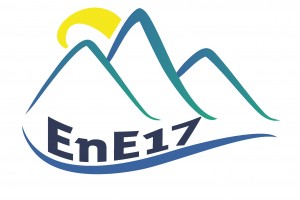 in Belgrade (Chamber of Commerce and Industry of Serbia, Terazije 23, 2nd floor, main hall). Conference is UN WED event. in Belgrade (Chamber of Commerce and Industry of Serbia, Terazije 23, 2nd floor, main hall). Conference is UN WED event.
Environmental Ambassadors for Sustainable Development in partnership with Chamber of Commerce and Industry of Serbia organize The Thirteenth Regional Conference ”Environment to Europe – EnE17”. Thematic area this year is Climate Change Education for Sustainable Development. The Conference is an opportunity for institutions, organizations and experts to present their research and exchange viewpoints regarding climate change and environmental education. We firmly believe that your scientific/research results and experience will substantially help a better understanding of these fields. Being aware of the necessity of a close cooperation between science and practice, including the practice within competent institutions, we invite you to take active participation in the Conference “Environment to Europe – EnE17”, either by preparing and presenting your paper or by contributing as an auditor and participant. First, you need to apply to the Conference “Environment to Europe” Program (http://feeserbia.com/ Conference Organizing Committee is pleased to inform you that the registration fee for paper publishing in the CD Conference Proceeding is 50 €. Students are exempt from paying the registration fee. More information: Dunja Prokić, Environmental Ambassadors for Sustainable Development, e-mail: eneconference@feeserbia.com, web site: http://ambassadors-env.com and http://feeserbia.com/. Environment to Europe Program Coordinator dr Dunja Prokić |
EASD and ECOSOC signals: Achieving sustainable development through infrastructure
Infrastructure is a pre-requisite for advances across the 2030 Agenda for Sustainable Development, including for reducing poverty, promoting economic growth, addressing inequality and ensuring environmental sustainability. Infrastructure is addressed directly through SDG 9, which commits the international community to build resilient infrastructure, promote inclusive and sustainable industrialization and foster innovation. Moreover, “investments in sustainable infrastructure are recognized as a major cross-cutting driver that can contribute to achieving all the SDGs”, as stated by Under-Secretary-General for UN DESA, Wu Hongbo, at the 2015 Global Forum on Development. Resilient infrastructure is essential for ensuring sustainable development for all. “If we are to achieve our goals, and leave no one behind, we must address large infrastructure gaps in developing countries,” said Secretary-General Ban Ki-moon at the inaugural Global Infrastructure Forum in April 2016.
“Developing countries, particularly the most vulnerable, need international support to bridge existing infrastructure gaps,” emphasized Secretary-General Ban Ki-moon during the Global Infrastructure Forum. Infrastructure gaps pose major challenges to the implementation of the SDGs. The financing gap for infrastructure in developing countries, for example, is estimated to be 1 to 1.5 trillion dollars annually. Through the Addis Ababa Action Agenda (AAAA), the international community has committed to support resilient, sustainable infrastructure and to provide a comprehensive framework for mobilising the means to finance it.
Infrastructure that enables countries to adapt to and mitigate climate change is needed to support the Paris Climate Change Agreement. New and resilient infrastructure is also needed to support sustainable urbanization, as the number of people living in cities in emerging economies is expected to double by 2030. Resilient infrastructure is needed, moreover, to cope with the increasing incidence and magnitude of natural disasters.
In recent years there have been several new global, regional and national initiatives aimed at increasing investment in infrastructure. In Africa, for example, infrastructure is a priority element for realizing the vision of Africa’s Agenda 2063. At the global level, the international community committed to support the realisation of resilient, sustainable infrastructure through the AAAA, and created a new Global Infrastructure Forum—which held its inaugural meeting in April—to facilitate access to financing and technical expertise.
The global discussion on infrastructure will continue on 21 July 2016 at UN Headquarters as part of ECOSOC’s 2016 thematic discussion on “Infrastructure for sustainable development for all”. The thematic discussion, part of ECOSOC’s High-level Segment, will engage a broad range of voices in a global dialogue on infrastructure for sustainable development that is inclusive and leaves no one behind. It will offer policy recommendations and inform the Inter-agency Task Force report on Financing for Development, as well as the 2017 Global Infrastructure Forum. For more information: UN Economic and Social Council (ECOSOC)
EASD already is addressing the issue of environmental infrastructure as the condition for sustainable development ( 1 , 2 , 3….), as well as by research and promotion ( A, B, C , …)
REPORT FROM EnE16-ENV.net, BELGRADE, SERBIA
The Regional Conference ‘’Environment to Europe – EnE16-ENV.net’’ was held on 6th of June 2016 in Belgrade (Serbia) to address issues related to climate changes and sustainability of resources. Traditionally, this Conference was organized by professional association “Environmental Ambassadors for Sustainable Development” and Chamber of Commerce and Industry of Serbia. Conference was UNEP WED event, supporting EU Integration process through project ’’Development of the ENV.net in West Balkans and Turkey: giving citizens a voice to influence the environmental process reforms for closer EU integration’’.
EnE16-ENV-net was opened with introductory speeches by Nermina Ljubovic, Executive Director of the Chamber of Commerce and Industry of Serbia, Stanojla Mandic, Deputy Commissioner for Information of Public Importance and Personal Data Protection of the Republic of Serbia, PhD Mirjana Drenovak-Ivanovic from Faculty of Law, University of Belgrade and member of the Government of the Republic of Serbia Negotiating Team for the Accession of the Republic of Serbia to the EU, responsible for specific sectors of Chapter 27 and prof. dr Anđelka Mihajlov, from Environmental Ambassador for Sustainable Development and member of the Government of the Republic of Serbia Negotiating Team for the Accession of the Republic of Serbia to the EU, responsible for specific sectors of Chapter 27. Conference was attended by representatives from government and non-government sectors, international organizations, scientific institutions and business associations.
Conference participants (about 170 registered participants) were unique in that: we have a respectable experts in the field of environment and climate change (both those with experience, and young professionals – who have difficulty finding employment in their profession). As the EU accession a significant priority for Serbia, so will the chapter relating to the environment and climate change (Chapter 27) will be increasingly important in the process that in our country we have European standards. Profession and experience should be the guarantor for the “right” solution to this path. Public participation in decision-making on issues relevant to the environment is one of the pillars of sustainability solutions. Appropriate environmental education is an important factor for the performance of the process of sustainable growth and development. Participants in the discussion have tried to provide answers to questions on how to be more effective in environmental protection and responsive to nature. More information
Agenda 2030 and SDGs in the focus of EASD work
Multi-stakeholder partnerships at the national, local, regional and international levels, that are solution-oriented and inclusive of all groups, including women, indigenous peoples and minorities, will be crucial to realizing these joint aspirations and will be a key element of the 2030 Agenda and SDG implementation.
The successful adoption of the 2030 Agenda for Sustainable Development Goals was the result of more than two years of intensive consultation and engagement of all stakeholders.
The UNEP Regional Office for Europe, in partnership with the European Economic and Social Committee and the European Environmental Bureau, organized a multi-stakeholders meeting on the implementation of the 2030 Sustainable Development Agenda, combined with the yearly UNEP Regional Consultation Meeting for Major Groups and Stakeholders on 12-13 November 2015 in Brussels, Belgium. EASD participated ( report).
Sustainable Development Indicators data and development for SEE region is underway through Platform Indicators Development. For Serbia, EASD team is focused on Environmental Sustainability, Science and Technology , Health and Hygiene and Energy and Environment . EASD promote The World Environmental Education Day, having the great event in school “Vuk Karadžić”, Surčin.
The 2nd meeting of the UN Environment Assembly (UNEA) will take place from 23-27 May, 2016 in Nairobi, Kenya. The meeting will be held under the overarching theme: “Delivering on the Environmental Dimension of the Post-2015 Development Agenda.” There will also be a Global Major Groups and Stakeholders Forum (GMGSF) held prior to UNEA-2 on 21 and 22 May 2016. Environmental Ambassadors (EASD) is organisation accredited in UNEP/UNEA.
In the preparatory phase, EASD participated in the process of UNEP Redefinition of its Youth Strategy, familiarise with the interactive version of the Bali Guideline Implementation Guide , reviewing new sustainable development agenda (results from open consultation on ‘grey‘ and “green” indicators are now available ).
The 2030 Agenda for Sustainable Development requested the UN Secretary General, in consultation with Member States, to prepare a report in preparation for the 2016 meeting of the High-level Political Forum, which outlines critical milestones towards coherent, efficient and inclusive follow-up and review at the global level, for consideration of the General Assembly. In order to informally contribute to the reflection, Major Groups and other Stakeholders have been invited to provide their views and inputs on these issues by completing an online questionnaire by 15 November 2015. The inputs and responses received is available on the Sustainable Development Knowledge Platform (our organisation is the member of SDKP). In addition, we keep eye on Open-ended Meeting of the Committee of Permanent Representatives to UNEP (OECPR) and Preparatory meeting for the 2nd Session of UNEA, 14-19 February 2016 – we registered our representative to participate.
EASD participated in the UNEP’s survey on the involvement of Major Groups and Stakeholders in the generation, utilization and dissemination of environmental information developed by UNEP. Below some of the key findings are highlighted:
· 63% of the organizations contributed to the generation of environmental information by UNEP to a moderate, large or very large extent
· Of contributions made, the greatest percentage, 56%, was to UNEP publications.
· 88% have accessed environmental information generated by UNEP; publications were the most common form of information accessed, with assessments and findings, and emerging issues coming a joint second.
· The most common way in which organizations accessed UNEP information was via the UNEP website, with the second most common mechanism being via email.
· 87%, have made use of information generated by UNEP either to a moderate, large, or very large extent. Organizations primarily used UNEP generated information for educational purposes, as a guide to their own work, or for analysis.
· 86% have contributed to the further dissemination of environmental information generated by UNEP, principally during meeting discussions or through posting on social media.
· 65% experienced no difficulties in contributing to, accessing, using or disseminating environmental information generated by UNEP, but for those who did the main issue was with language constraints.
· The most effective mode for organizations to be involved in the generation, access, receipt and dissemination of environmental information generated by UNEP was email; this was followed by the UNEP website and through social media.
· 85% successfully received the type of information they needed from UNEP either to a moderate, large or very large extent.
· Suggestions on how UNEP could improve included:
o greater interaction from UNEP on social media
o improvements to websites to make them more user-friendly
o sending of hard copies of important reports and documents to resource centers
o the use of shorter bulletin messages to facilitate understanding of the public
o greater dissemination
o more translations
o timely information sharing to allow sufficient time for review and comments
o the use of Google hangouts, online workshops
o more active engagement with mass-media (e.g. TV)
We “keep eye” on the multi-stakeholder dialogue will be held on Friday 27 May 2016 from 12:30 hrs to 14.00 hrs, TO BE HELD DURING THE HIGH-LEVEL SEGMENT OF UNEA-2. It will be open to all interested delegations and will be organized as a moderated, interactive dialogue session. The proposed theme for the dialogue is: “Restoring and sustaining healthy ecosystems for people and planet: partnerships to jointly deliver on the environmental dimension of Agenda 2030”.
In February 2016, EASD promote stronger position of Environmental NGOs in the draft UNEP Stakeholders Engagement Policy (SEP) . More in local language
Save the date and participate: June 6, 2016 – Environment to Europe Conference
We are pleased to invite you to The Twelfth Regional Conference ”Environment to Europe EnE16 – ENV.net”, which will be held on June 6th 2016 in Belgrade (Chamber of Commerce and Industry of Serbia). Conference is UNEP WED event. Conference supports EU Integration process through the project “Development of the ENV.net in West Balkans and Turkey: giving citizens a voice to influence the environmental process reforms for closer EU integration”.
Environmental Ambassadors for Sustainable Development in partnership with Chamber of Commerce and Industry of Serbia organize The Twelfth Regional Conference ”Environment to Europe” EnE16 – ENV.net. Thematic area this year is Climate Change and Sustainability of Resources.
The Conference is an opportunity for institutions, organizations and experts to present their research and exchange viewpoints regarding climate change and sustainable use of natural resources.
We firmly believe that your scientific/research results and experience will substantially help a better understanding of these fields. Being aware of the necessity of a close cooperation between science and practice, including the practice within competent institutions, we invite you to take active participation in the Conference “Environment to Europe – EnE16-ENV.net”, either by preparing and presenting your paper or by contributing as an auditor and participant.
Conference Organizing Committee is pleased to inform you that, thanks to the support of the EU through ENV.net project, there will be no participation fee.First, you need to apply to the Conference “Environment to Europe” Program (http://feeserbia.com/
If you experience problems completing the registration, please send e-mail to: eneconference@feeserbia.com .
More information: Environmental Ambassadors for Sustainable Development, e-mail:eneconference@feeserbia.com, web site: http://ambassadors-env.com and http://feeserbia.com/ .
Environment to Europe Program Coordinator
dr Dunja Prokić
SDGs as the relevant part of the context within which FEE operates
After a long series of intergovernmental negotiations on various themes,which saw a broad participation from major groups and civil society stakeholders under the guidance of the United Nations State Members, the Goals have been adopted on September 25th at the New York United Nations Summit by 193 Member States. In the same occasion, the UN launched their post-2015 development agenda, in which the Goals are integrated. UN Member States, the civil society and private sector contributors will use this new, universal set of goals, targets and indicators to guide development global efforts over the next 15 years in a concerted international action within the broadest, most ambitious development agenda ever agreed at the global level. The 17 Goals and 169 Targets are meant to be action-oriented, concise and easy to communicate, aspirational, global in nature and universally applicable to all countries, while taking into account the different national realities, capacities and levels of development and respecting national policies and priorities.
The Foundation for Environmental Education with its global network thus needs to frame and highlight its role as a stakeholder and trendsetter in the Sustainable Development process, particularly for environmental, educational and eco-tourism matters. The SDGs will define a relevant part of the context within which FEE operates, thus we are driven to reflect our work in the Goals.
FEE through its mission of fostering awareness, knowledge, participation, commitment, skills, actions and creativity on the environment and on sustainable development, shares the core values behind the set of SDGs. The programmes based on Education for Sustainable Development, such as YRE, Eco-Schools and LEAF show a strong link with the educational Goal (SDG 4) and the Goal on global partnership for sustainable development (SDG 17). FEE’s tourism eco-labels, Green Key and Blue Flag, on the other hand, have a focus on making human settlements inclusive, safe, resilient and sustainable (SDG 11) and on implementing tools for monitoring sustainable development impacts for tourism (SDG 12.b).
Thus, FEE as an umbrella organisation aims at reaching objectives as indicated in the SDGs:
– “Ensure healthy lives and promote well-being for all at all ages” (SDG 3).
– “Ensure inclusive and equitable quality education and promote life-long learning opportunities for all” (SDG 4).
– “Ensure availability and sustainable management of water..” (SDG 6),
– “Ensure access to affordable, reliable, sustainable, and modern energy for all” (SDG 7),
– “Conserve and sustainably use the oceans, seas and marine resources for sustainable development” (SDG14), as well as to
– “Protect, restore and promote sustainable use of terrestrial ecosystems..” (SDG 15).
– “Promote sustained, inclusive and sustainable economic growth..” (SDG 8), particularly to “..Implement policies to promote sustainable tourism which creates jobs, promotes local culture and products” (SDG 8.9).
– “Make cities and human settlements inclusive, safe, resilient and sustainable” (SDG 11).
– “Ensure sustainable consumption and production patterns” (SDG 12).
– “Take urgent action to combat climate change and its impacts” (SDG 13).
– “..Promote sustainable use of terrestrial ecosystems..” (SDG 15).
– “Promote peaceful and inclusive societies for sustainable development..” (SDG 16), particularly to build transparent institutions and promote non-discriminatory policies for sustainable development (SDGs 16.6, 16.b) with a positive, proactive, democratic modus operandi and a strong synergic support to civil society and third sector.
– “Strengthen the means of implementation and revitalize the global partnership for sustainable development” (SDG 17) through a geographically spread, multi-stakeholder approach.
Programmes’ overview:
a) YRE: Young Reporters for the Environment is a network of international youth engaged in environmental journalism and Education for Sustainable Development, where the students investigate an environmental problem and report it to the local community, while, at the international level, they may cooperate with young reporters from other countries for sharing information or data, with the aim of proposing a solution and disseminating it.
The most evident link between the Young Reporters for the Environment programme and the SDGs is found in the Goal 4:
“Ensure inclusive and equitable quality educationand promote lifelong learning opportunities for all” and its subparagraphs“..increase … the number of youth and adults who have relevant skills, including technical and vocational skills, for employment, decent jobs and entrepreneurship” (SDG 4.4) with the aim of learning to think critically, “ensure all learners acquire knowledge and skillsneeded to promote sustainable development, including among others through education for sustainable development and sustainable lifestyles, human rights, gender equality, promotion of a culture of peace and non-violence, global citizenship, and appreciation of cultural diversity and of cultures contribution to sustainable development” (SDG 4.7) for being able to connectwith concrete issues.
The environmental educational programme thus also wish for taking “action to combat climate change and its impacts” (SDG13), specifically for what concerns to “improveeducation, awareness raising and human and institutional capacity on climate change mitigation, adaptation, impact reduction, and early warning” (SDG 13.3) through active solution-oriented learning. The programme canalso help to“promote mechanisms for raising capacities for effective climate change related planning and management, in LDCs, including focusing on women, youth, local and marginalized communities” (SDG 13.b).
YRE is a network of young people educating for sustainable developmentand environmental issues in general, thus it also supportsthe aim of many other SDGs, such as:
“Promotesustainable agriculture” (SDG 2).
“Promote well-beingfor all at all ages” (SDG 3).
“Achieve gender equality and empowerall womenand girls” (SDG 5).
“Ensure availability and sustainable management of waterand sanitation for all”, supporting and strengthening the participation of local communities (SDG6)
“Ensure access to affordable, reliable, sustainable, and modern energyfor all”(SDG7)
“Promotesustained, inclusive and sustainable economic growth, full and productive employment and decent work for all”, developing measures that support creativity and innovation (SDG8)
“Build resilient infrastructure, promoteinclusive and sustainableindustrializationand fosterinnovation”enhancing scientific research (SDG9)
“Make cities and human settlements inclusive, safe, resilient and sustainable … Reduce the adverse per capita environmental impact of cities, including by paying special attention to air quality, municipal and other waste management”(SDG 11)
“Ensure sustainable consumption and production patterns”, raising awareness on sustainable development and lifestyles which are in harmony with nature (SDG12)
“Conserve and sustainably use the oceans seas and marine resources for sustainable development”, aiming to preventmarine pollution and protectmarine and coastal ecosystems (SDG14)
“Protect, restore and promote sustainable use of terrestrial ecosystems, sustainably manage forests, combat desertification, and halt and reverse land degradation and halt biodiversity loss”, promoting the implementation of sustainable management of the forests (SDG15)
YRE helps to “Promotepeaceful and inclusive societies for sustainabledevelopment..”(SDG16)
YRE can encourage to “..Revitalize the global partnership for sustainable development” (SDG17)
The journalistic piece can influence the local communities to take action on various environmental matters
b) ECO-SCHOOLS: A global student-led change process in Education for Sustainable Development which involves also teachers’ training, integration in the school curriculum, environmental reviews, action plans, monitoring and evaluation, informing and involving the local community, setting an eco-code focusing on the various environmental themes (water, energy, waste, global citizenship..).
The programme is fully in line with the Goals:
“Ensure inclusive and equitable quality education and promote lifelong learning opportunities for all” increasing the number of youth and adults with relevant skills and ensuring that all learners acquire knowledge for promoting sustainable development, developinga culture of peace and global citizenship while upgrading education facilities to child, disability and gender sensitive ones as to provide a safe, inclusive and effective learning environment for all(SDG 4)
“Make cities and human settlements inclusive, safe, resilient and sustainable”, strengthening efforts to safeguard the world’s cultural and natural heritagewith a focus on schools’ waste management, resource efficiency and climate change mitigation (e.g. Litter Less Campaign) (SDG 11)
“Strengthen the means of implementation and revitalize the global partnership for sustainable development” (SDG 17).
The implementation of the Eco-Schools programme also works towards the achievement of the aim of more SDGs, such as:
“Ensure healthy lives and promote well-beingfor all at all ages” (SDG 3)
“Ensure availability and sustainable management of water and sanitation for all”, improving water quality and water-use efficiency with pollution reduction, minimizing the release ofhazardous chemicals, halving the proportion of untreated wastewater,increasing recycling or safe reuse and ensuring sustainable withdrawals together with the strengthening of the participation of local communitiesfor such purposes (SDG 6)
“Ensure access to affordable, reliable, sustainable, and modern energy for all” increasing the share of renewable energy and energy efficiency, with the result of creating also savings (SDG 7)
“Promote sustained, inclusive and sustainable economic growth, full and productive employment and decent work for all”with the improvement of resource efficiency in consumption and production as to endeavour to decouple economic growthfrom environmental degradation (SDG 8)
“Build resilient infrastructure, promote inclusive and sustainable industrialization and foster innovation” (SDG 9)
“Ensure sustainable consumption and production patterns”, using the natural resources efficiently, reducing the waste generation (including the food waste) and managing sustainably the chemical products (SDG 12)
“Take urgent action to combat climate change and its impacts”specially improving education, awareness raising and capacity on climate change mitigation, adaptation, impact reduction and early warning (SDG 13)
“Protect, restore and promote sustainable use of terrestrialecosystems..” (SDG 15)
“Promotepeacefuland inclusivesocietiesfor sustainable development… and build effective, accountable and inclusive institutions at all levels” highlighting the theme ofsocial justice(SDG 16).
c) LEAF: Learning About Forests wants to encourage environmental education through awareness raising among students, teachers and the wider school community, to increase knowledge about the key role forests play for sustainable life on our planet, reflecting their cultural, ecological, economic and social functions, with themes as biodiversity, climate, products or services, codes and myths.
The key Goals linked to the Learning About Forests programme are:
“Ensure inclusive and equitable quality education and promote lifelong learning opportunities for all”, increasing the number of youths and adults who have relevant skills and ensuring that all learners (referring to the whole school community) acquire knowledge and skills needed to promote sustainable development, including through education for sustainable development and lifestyles in harmony with nature (SDG 4)
“Ensure availability and sustainable management of water..”, protecting water-related ecosystems and supporting the participation of local communitiesfor improving water management(SDG 6)
“Protect, restore and promote sustainable use of terrestrial ecosystems, sustainable manage forests, combat desertification, and halt and reverse land degradation and halt biodiversity loss”, ensuring a sustainable use of terrestrial and inland freshwater ecosystems and their services, including their biodiversity, in particular forests, wetlands mountains and drylands, preventing the extinction of threatened species(SDG 15)
The principles behind LEAF are compatible with the aim of more SDGs:
“End hunger, achieve food security and improved nutrition, and promotesustainable agriculture”, implementing agricultural practices, such as the tree-planting events, which help maintain ecosystems and progressively improve land and soil quality (SDG 2)
“Ensure healthy lives and promote well-being for all at all ages” (SDG3)
“Ensure access to affordable, reliable, sustainableand modern energyfor all” (SDG7)
“Promote sustained, inclusive and sustainable economic growth, full and productive employment..”, endeavouring to decouple economic growth from environmental degradation and devising policies that encourage sustainable tourism which promotes local culture and products, such as jobs related to the forest, while learning to respect the forest community as well as its myths, laws and codes (SDG8)
“Make cities and human settlements inclusive, safe, resilient and sustainable”, strengthening efforts to protect and safeguard the world’s cultural and natural heritage while supporting positive links between the urban and the rural areas as to widen the access to inclusive green and publicspaces (SDG11)
“Ensure sustainable consumption patterns” through relevant information and awareness for achieving sustainable management and efficient use of natural resources (SDG12)
“Take urgent action to combat climate change and its impacts” improving education and awareness raising on climatechange and the role of forests (SDG13)
“Strengthen the means of implementation and revitalize the global partnership for sustainable development” (SDG17).
d) BLUE FLAG: The world’s biggest voluntary eco-label for beaches, marinas and eco-tourism boats works towards sustainable development through compliance with criteria dealing with environmental education and information, environmental management, water quality, safety and other services.
The principles and rules of the programme comply with the content of many Goals:
“Ensure availability and sustainable management of water and sanitation for all”, improving water quality with pollution reduction and minimization of hazardous chemicals release, increasing recycling, safe reuse and water-use efficiency through the usage of sustainable withdrawals as to protect water-related ecosystems also with the support and participation of local communities (SDG 6)
“Promote sustained, inclusive and sustainable economic growth, full and productive employment and decent work for all”improving the resource efficiencyin consumption while devising and implementing policies to promote sustainable tourism which creates job, promotes local culture and products.Blue Flag focuses as well on the protection of labour rights together with the promotion of a safe and secure working environment and the prohibition of child labour (SDG 8)
“Build resilient infrastructure..”upgrading it as to be sustainable and equipped with clean technologies (SDG 9)
“by 2030 empower and promote the social, economic and political inclusion of all irrespective of age, sex, disability, race, ethnicity, origin, religion or economic or other status”with the aim of reducing inequalities and discriminatory practices for wages as social protection policies (SDG 10.2)
“Make cities and human settlements inclusive, safe, resilient and sustainable”enhancing capacities for participatory and sustainable human settlements as to strengthen the efforts for safeguarding the world’s cultural and natural heritage while providing universal access to the public spaces particularly for women and children, older persons and persons with disabilities(SDG 11)
“Ensure sustainable consumption and production patterns”for the efficient use of natural resources, through a sound management and reduction of chemicals and wastes and the promotion of sustainable public procurement practices (SDG 12)
“Conserve and sustainably use the oceans, seas and marine resources for sustainable development”preventing and reducing marine pollutionalso from land-based activities, addressing the impacts of ocean acidification and conserving coastal and marine areas. Blue Flags also contributes in increasing the economic benefits to SIDS and LDCs with the sustainable use of marine resources through tourism (SDG 14)
“Protect, restore and promote sustainable use of terrestrial ecosystems… halt and reverse land degradation and halt biodiversity loss” for halting the loss of biodiversity and preventing the extinction of threatened species, also through the integration of ecosystem values into local planning policies (SDG 15).
The implementation of the Blue Flag programme also work towards the aim of several more SDGs:
• “Ensure healthy lives and promote well-being for all at all ages” (SDG3)
• “Ensure inclusive and equitable quality education and promote lifelong learning opportunities for all”as education has a central role in the programme and reaches out for all the persons involved in it as well as for theusers (SDG4)
• “Achieve gender equality and empower all women and girls”(SDG5)
• “Ensure access to affordable, reliable, sustainable,and modern energy for all” to help increasing the share of renewable energy and energy efficiency(SDG7)
• “Take urgent action to combat climate change and its impacts”(SDG 13)
• “Promote peaceful and inclusive societies for sustainable development..”enforcing non-discriminatory policies for sustainable development (SDG16)
• Strengthen the means of implementation and revitalize the global partnership for sustainable development”through a multi-stakeholder partnership, which involves also public partnersand local authorities,where knowledge and expertise are shared (SDG17)
e) GREEN KEY: This eco-label for tourism facilities (hotels, campsites, small accommodations, tourist attractions and restaurants) is a voluntary award that aims at contributing to prevent climate change and reach sustainable tourism by awarding and promoting best practice, with the goal of changing the environmental practices at the awarded establishments but also the behaviour of tourism actors, including guests, staff, suppliers, authorities, local communities so to involve them in increasingly safeguarding their own environment. The focus is on themes such as environmental management, water, waste and energy saving, involvement and awareness of guests and staff, management of food and beverage and open spaces.
For what concerns the part of the programme related to environmental management, the Goals mainly involved are:
“Ensure … sustainable management of water..” improving its quality, having the proportion of untreated wastewater, increasing recycling, safe reuse and sustainable withdrawals of freshwater (SDG 6)
“Build resilient infrastructure, promote inclusive and sustainable industrialization and foster innovation”setting rules for developing or upgrading quality infrastructures to support economic development and human well-being for an increased resource use efficiency and greateradoption of clean technologies (SDG 9)
“Make … human settlements inclusive, safe, resilient and sustainable”paying attention to air quality, indoor environment and waste management as to tackle climate change(SDG 11)
“Ensure sustainable consumption and production patterns”with rules for achieving sustainable management of natural resources,respecting eco-criteria for food and beverages, reducing waste generationand achieving environmentallysound management of chemicals (SDG 12).
This way the programme “develops and implements tools to monitor sustainable development impacts for sustainable tourism which creates jobs, promotes local culture and products” (12.b).
As an eco-tourism programme focused on the environmental awareness of staff and guests, the Goals principally involved are:
“Ensure healthy lives and promote well-being..” where the programme has to encourage the users to take part in green activities (SDG 3)
“..ensure all learners acquire knowledge and skills needed to promote sustainable development, including among others through education for sustainable development and sustainable lifestyles, human rights..” as part of the “educational Goal” (number 4), whereby the learners are the recipients of the environmental information expected in the implementation of the programme (SDG 4.7)
“Promote sustained, inclusive and sustainable economic growth, full and productive employment and decent work for all”, as the Green Key programme sets Corporate Social Responsibility and safety rules for the workers(SDG 8)
“Take urgent action tocombat climate change and its impacts”through a reduced environmental impact but also through the improvement of education and awareness raising for both the facilities’ staff and users (SDG 13)
“..revitalize the global partnership for sustainable development” (SDG 17).
Indicators and a Monitoring Framework for Sustainable Development Goals
The Sustainable Development Solutions Network (SDSN) has recently published its final report on Indicators and a Monitoring Framework for the Sustainable Development Goals: Launching a data revolution for the SDGs. This report is the result of over 18 months of consultations led by the SDSN with the contributions of nearly 500 organizations and thousands of individuals – draft versions of the report have so far been downloaded over 80000 times.The report outlines a tiered monitoring framework at the national, global, regional, and thematic levels, and presents a concise set of 100 Global Monitoring Indicators. This limited number of indicators can comprehensively track all 169 OWG targets while balancing countries’ capacities and domestic monitoring commitments. This report is a contribution to the ongoing post-2015 processes, including the Inter-Agency and Expert Group on the SDGs (IEAG-SDGs).
Environmental Ambassadors for Sustainable Development is the Member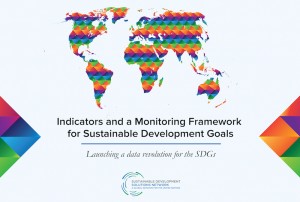 of the Sustainable Development Solutions Network – SDSN .
of the Sustainable Development Solutions Network – SDSN .
We follow Informal interactive hearings with representatives of NGOs, CSOs, major groups and the private sector on the post-2015 development agenda, in NY.
One more publication , as the outreach in Rio+20 process is 2015 Food Security Report, with key findings : – For the world as a whole, the MDG 1 indicators for prevalence of undernourishment and underweight children under 5 years of age have largely moved in parallel, providing a consistent message regarding achievement of the hunger target; – Underweight in children is expected to decline less rapidly than undernourishment, given that better hygiene conditions, access to clean water and more varied diets usually require more investment and more time to materialize than enhanced availability of calories: – Despite showing rapid reduction, Southern Asia is the region with the highest historical prevalence of underweight children among the developing regions; – In sub-Saharan Africa, there has been limited progress in reducing both undernourishment and child underweight; – Economic growth is necessary for sustaining progress in efforts to reduce poverty, hunger and malnutrition. But it is not sufficient; – Inclusive growth – growth that provides opportunities for those with meagre assets, skills and opportunities – improves the incomes and livelihoods of the poor, and is effective in the fight against hunger and malnutrition; – Improving the productivity of resources held by family farmers and smallholders is, in most cases, an essential element of inclusive growth and has broad implications for the livelihoods of the rural poor and for the rural economy in general; – In many situations, international trade openness has an important potential for improving food security and nutrition by increasing food availability and for promoting investment and growth; – Social protection directly contributes to the reduction of hunger and malnutrition by promoting income security and access to better nutrition, healthcare and education; – Prevalence of food insecurity and malnutrition is significantly higher in protracted crisis contexts resulting from conflict and natural disasters. For more information
ENV.net on the margins of ECF Annual Meeting in Brussels with European Commision
Some of ENV.net partners participated on ECF Annual Meeting in Brussels with European Commision (24-25 November 2014), using that opportunity to promote results of ENV.net project and to promote partnership. ENV.net broshure publish by Albanian partner is distributed.
Agenda of the Meeting includes:
– NGO SESSION: Self-organizing and preparatory meeting for discussion with the EC
– DIALOG WITH DG ENVIRONMENT REPRESENTATIVES: Mr Nicholas Hanley (head of Unit of International, Regional and Bilateral Relations), Mrs Madalina Ivanica (Policy officer-Unit of International, Regional and Bilateral Relations), Ms Marta Moren Abat (Policy Officer-Unit of International, Regional and Bilateral Relations), Mrs Slavitza Dobreva de Schietere (Policy Officer-Unit of Enforcement, Cohesion Policy and European Semester), Ms Iris Valkovic (Policy Officer-Unit of Enforcement, Cohesion Policy and European Semester), Mr Dimitrios ZEVGOLIS (DG Climate Action) and Mrs Ivana Mijatovic (DG Climate Action ), on thematic issues:
- – Water
- – EIA/SEA
- – Climate Change
Annual Meetings build on the outcomes of all Environment and Climate Forum (ECF) activities and the events represent the key opportunity for the civil society to get engaged into dialogue with high representatives of the European Commission. The agenda for the annual meetings is prepared in a bottom-up manner, with key input from the NGOs, as well as in consultation with the EC. The annual meetings are planned in a way to allow enough room for NGOs to self-organize , to provide state-of-the art information on EU policies and legislation, to develop capacities of NGOs, and allow time for bilateral meetings . Following preparatory steps at country level, the organisation of annual meetings builds on the outcomes of 8 conducted in-country preparatory meetings and wider consultations.
Key objectives of the meeting:
(i) To disseminate information (to the broad NGO community and other relevant stakeholders) about recent development, planned climate and environment policies and legislation of the European Union and evaluation of progress and bottlenecks in the EU accession process from the EC perspective;
(ii) To increase capacities of the regional NGOs to actively participate in EU enlargement;
(iii) To bring to the attention to the EU the enlargement points and concerns of civil society and discuss how to address issues and cases identified by the NGOs;
Participants: Representatives of 21 NGOs selected for ECF-ECRAN, Representatives of the European Commission, ECF Support Team and ECRAN experts.
You have to know before you act: Call for participation to ENV.net e-learning courses
TITLE: FPA 306642 : Call for participation to new ENV.net e-learning course: Get funding from the EU
After the success of the e-learning course Social Media, Activism and Participation launched in June 2014, ENV.net team decided to develop a new course: Get funding from the European Union.
The course provides an understanding of the EU funding and programming system with a brief presentation of the main EU Institutions involved in this process. It also presents the funding opportunities available for CSOs from Western Balkans and Turkey to implement their projects. Moreover this course focuses on the necessary steps to carry out in order to apply for Grants under the EU Calls for proposals system.
Course modules
The course is designed for beginners in EU-funded projects and the calls for proposals system and does not require a preliminary knowledge of the subject. It is delivered through the ENV.net e-learning platform and it is divided into four modules:
- The EU Institutions: this first module will give participants a broad idea of the most important EU Institutions involved in the decision making process, with a special focus on the role of the EC and its DGs involved in the external aid programmes. The role of the EU Delegation and of the EEAS will be also explained in this module
- EU Funding & Programming: the focus of this module is on the financial framework under which the European Commission and EU Delegations work to deliver aid to partner countries. It explains how the programming system works, from the Multi-annual Financial Framework with most interesting Financial instruments, to Country Strategy Papers, to the Annual Work Programme. This will help participants to understand how to align their actions to the objectives established by these programmes and consequently to get funding.
- The Calls for Proposals system: in this module, participants will get practical information on how CSOs from Western Balkans and Turkey can look for and apply to calls for proposals launched by the different DGs of the European Commission, in particular DG Enlargement and DG EuropeAid, to get contributions (Grants), for the execution of their projects.
- 4. Applying to a call for proposals: in the last module, participants will briefly look into the documents to be submitted to the EC to apply for a Grant. i.e. the application form, the budget and the logical framework
Additional information
The course offers video-lessons, tests, exercises and also additional material (e.g. toolkits, official EU documents, useful links) for gaining insight into the proposed topics.
The participation to this on-line course requires a computer with a reliable internet connection and a web-browser (e.g. Internet Explorer, Firefox). The course materials are provided in the course modules. Participants are not required to purchase any additional software, materials, resources, or books.
This is an on-line self-learning course and offers high degree of flexibility to participants who are free to follow the lessons at any time, but are requested to complete the course within its global duration of 15 days. The average duration of the course is 3 days.
The course is in English and it is free of charge.
Application procedures
There are 3 periods in which interested users can attend the course Get funding from the EU
- 14th October – 28th October 2014
- 4th November – 18th November 2014
- 25th November – 9th December 2014
Moreover ENV.net course Social media, activism and participation is also still running and next sessions will be on the following dates:
- 4th November – 18th November 2014
- 9th December – 23rd December 2014
New e-learning sessions will be launched in 2015 for both courses.
To apply in one of these courses, you should first registered in the ENV.net e-learning platform from this link: http://dl.env-net.org/ by clicking on ‘Register’ and then follow the registration and subscription procedure.
Once chosen the course from the course catalogue, this will be accessible from the first day of the course period.
Please contact ENV.net staff (env.net-helpdesk@puntosud.org ) and see ENV.net website for additional information concerning these courses and the registration process.
This news item has been published with TACSO assistance. The contents of this news item are the sole responsibility of the FPA which is listed in the contact details, and can in no way be taken to reflect the views of TACSO and the European Union.
“Little progress” in Chapter 27 issues in 2013, according to EC
Serbian first priority is accession to EU.
EC Delegation in Serbia, present to relevant CSOs, on October 18, 2013 , Serbia Progress Report 2013, in which the Commission services present their assessment of what Serbia as the candidate country has achieved over the last year. Presentation on 2013 Reports’ economic chapters is followed by discussion by CSOs representatives, including the NGOs as the one of category of CSOs. Environmental Chapter have great attention in discussion part of the meeting.
Related to Chapter 27, overall EC conclusions is “little progress”.
Although there are a lot of challenges ( EU Enlargement Factsheets – Energy, Climate Change and Environment ), EC conclusion is in some relevant segments different that ENV.net Study (ENV.net-Study-Extended-Summary-June-2013 ).
ENV.net Serbia Team prepared document: Reading of 2013 Progress Report for Serbia and Strategy by ENV.net Serbia Team ( Serbia 2013 Progress Report and Strategy – Reading by ENV.net Serbia Team ). Resulting key words are : Group 1 : civil society organizations, empowered civil society, Dialogue between decision makers and stakeholders , Public awareness, public participation and consultation process; Group 2: sustainable growth, synergies between environment and economy, emissions to air /air quality , waste management , environmental governance , climate change, protected areas, water management, chemicals management, environmental impact assessment, integral pollution and prevention control (industrial emissions); Group 3: implementation of adopted legislation, Intra- and inter-institutional cooperation, proper functioning of the core institutions, coordination of sectoral policies; Group 4: the skills gap, education and training.
Some background information for SERBIA: candidate – applied in 2009, obtained candidate status in March 2012. The EU-facilitated dialogue between Belgrade and Pristina was launched in March 2011. The First agreement of principles governing normalisation of relations was reached with Kosovo in April 2013. The momentum of reforms has also been reinvigorated in Serbia. The European Council decided in June 2013 to open accession negotiations. The first Intergovernmental Conference on Serbia’s accession negotiations will be held in January 2014 at the very latest, after the Council adopts the negotiating framework, which was proposed by the Commission in July 2013. In the meantime, the ‘screening’ began in September 2013. The Stabilisation and Association Agreement (SAA) entered into force on 1 September. – see more
EASD approved as the member of UN Sustainable Development Knowledge Platform
Since the first UN Conference on Environment and Development in 1992 – the Earth Summit – it was recognized that sustainable development could not be achieved by governments alone. This notion is reflected emphatically in the landmark outcome document of that Summit, “Agenda 21”. Section 3 underscores the criticality of harnessing expertise and capacity from all sectors of society and all types of people: consumers, workers, business owners, farmers, students, teachers, researchers, activists, indigenous peoples, and other communities of interest.
Sustainable development goes together with allowing people to broadly engage in development policy making. UN Sustainable Development Knowledge Platform serves to provide wide access to information and knowledge for sustainable development, through its online and social media. EASD involvement in process is approved by UN. It also helps build the capacity, knowledge and skills base of Major Groups. It supports, facilitates and monitors voluntary Partnerships for Sustainable Development and monitors the more than 750 voluntary commitments registered at Rio+20. It also promotes online and face-to-face knowledge and skills acquisition by stakeholders through its SD-Learning programme.
Environment and Climate Forum – ECRAN
ECRAN (Environment and Climate Regional Accession Network), financed by EU and managed by the European Commission, assists the beneficiaries in exchange of information and experience related to preparation for accession.
EASD is member organisation in the project ECRAN (ENVIRONMENT AND CLIMATE REGIONAL ACCESSION NETWORK) – ASSISTS THE BENEFICIARIES ON THEIR WAY TOWARDS THE TRANSPOSITION AND IMPLEMENTATION THE EU ENVIRONMENTAL AND CLIMATE POLICIES AND INSTRUMENTS AS A KEY PRECONDITION FOR EU ACCESSION.
Within the ECRAN project, it is the component ECF.
The overall objective of the Environment and Climate Forum (ECF) is to strengthen the role of public participation in the approximation and accession process. In doing so, the ECF provides wide ranging opportunities for the civil society and its active involvement in the approximation process, assist in capacity development of the NGO sector and provide opportunities for improving the stakeholders dialogue. In doing so, there are four main activities to be implemented within the frame of the project.
Activities could be followed on the ECRAN web site.
ENV.net snapshots from CSOs responds to questionnaire
42 CSOs responded to ENV.net questionnaire (March-April 2013). 80% were NGOs (majority having interest in environmental issues “among the others”, and minority established as “environmental” NGOs ) while 20% belonged to other categories of the CSOs.
As one of the main interests, need for education is identified. Most of the CSOs agreed that teaching/learning about environmental issues, environmental problems and solutions throughout informal education for adults as for example are seminars, and semi-formal education as for example are implementation of international program Eco-Schools, might be the most fruitful way to improve status of their knowledge about environmental issues in our country. Most CSOs were interested to hear more about ENV.net project.
Regarding different segments of environmental acquis, most of the CSOs which answered ENV.net questionnaire were interested to waste management (i.e. recycling), nature protection, and public access to environmental information.
2013 Consultative Meeting on Environment and Climate Change – EPD preparation
The Delegation of the EU to Serbia organized, together with the DG Environment colleagues, a consultative meeting with the NGO representatives on 7th March 2013, in EU Delegation premises in Belgrade. The purpose of the meeting is preparation for the Enhanced Dialogue on Environment and Climate Change. Ms Madalina IVANICA, DG Environment, Mr Dimitrios ZEVGOLIS, DG Climate Action and Mr Rainer FREUND, Delegation of the EU to Serbia, lead the meeting.
Among the invited CSOs participants, Environmental Ambassadors for Sustainable Development representatives at the meeting were: Andjelka Mihajlov (who was Thematic Expert in Environment Forum Project http://www.envforum.eu ) and Dragana Grujicic. Within the context of the CSOs role in supporting environmental and climate change EU accession, A. Mihajlov informed on potentials of ENV.net project (See http://www.tacso.org/doc/130110_information-sheet-ENV.NET-project_REVISED.pdf for more information).
Participation to EC meeting in Brussels, January 2013
Eighteen projects (selected out of 172 applications) will be funded for the next two years by the European Union as a part of Instrument for Pre-accession Assistance (IPA) and Civil Society Facility (CSF) funds. More about these projects at (https://sites.google.com/site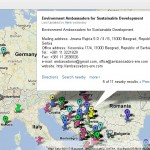
Environmental Ambassadors for Sustainable Development is participating as a partner in one of the selected projects: Development of the ENV.net in West Balkan and Turkey: giving citizens a voice to influence the environmental process reforms for closer EU integration.
On the 21st of January, 2013, the European Commission organized a joint kick-off meeting in Brussels, for the project leaders and partners of the 18 selected projects. The purpose of the meeting was to give project coordinators detailed information on administrative and financial aspects of managing their projects. It was also an opportunity to meet EU and TACSO representatives and to network with other project coordinators.
Together with five other partners participating in the ENV.net project, Environmental Ambassadors for Sustainable Development representative (Natasa Zugic-Drakulic) attended this meeting.


